January 4, 2018
December 7, 2016
ePRHYME feat. Jon Madof—"Heavy Shtetl"
"Heavy Shtetl" is the second installment in ePRHYME'S series of Rap/Duets, which pair his densely packed poetic rhymes with a solo master instrumentalist.
For "Heavy Shtetl" ePRHYME has teamed up with Zion 80 front-man Jon Madoff to explore the creative process of "making music out of noise."
***Warning from ePRHYME: Acquired taste! Not for everyone.
August 29, 2016
Catching up with five "must listen" new releases
I am once again looking for a next gig (if you know someone in the Boston area who needs a cloud computing consultant/Project Manager/Scrum Master, do contact meAshkenaz Festival in a few days:
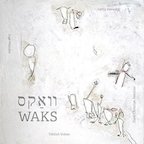 This is one of the most interesting and successful "re-mix" efforts I've heard. A group of musicians in Germany has pulled archival recordings and integrated into their covers. The material is wonderful and nicely extends our repertoire, and encourages more to consult the same sources: Waks / Yiddish Voices, 2015. Highly recommended.
This is one of the most interesting and successful "re-mix" efforts I've heard. A group of musicians in Germany has pulled archival recordings and integrated into their covers. The material is wonderful and nicely extends our repertoire, and encourages more to consult the same sources: Waks / Yiddish Voices, 2015. Highly recommended.
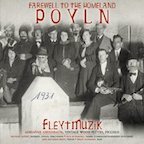 I always look forward to concerts and recordings by klezmer flautist Adrianne Greenbaum. This new one is especially noteworthy as it brings a klezmer family repertoire back to life: Fleytmuzik / Poyln, 2016
I always look forward to concerts and recordings by klezmer flautist Adrianne Greenbaum. This new one is especially noteworthy as it brings a klezmer family repertoire back to life: Fleytmuzik / Poyln, 2016
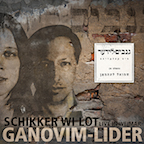 Recordings like this remind us why we miss the late Franka Lampe (and how wonderful it is that her partner on this recording, Fabian Schnedler, is just hitting his stride—see him next weekend with Semer Ensemble in Ashkenaz!). In this case, the duo mine field recordings amongst Jewish criminals (an obvious place to look for those who know of the reputation of klezmorim back in the day). Check out Schikker Wi Lot / Ganovim-Lider, 2016 and enjoy.
Recordings like this remind us why we miss the late Franka Lampe (and how wonderful it is that her partner on this recording, Fabian Schnedler, is just hitting his stride—see him next weekend with Semer Ensemble in Ashkenaz!). In this case, the duo mine field recordings amongst Jewish criminals (an obvious place to look for those who know of the reputation of klezmorim back in the day). Check out Schikker Wi Lot / Ganovim-Lider, 2016 and enjoy.
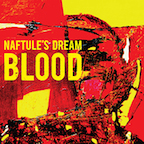 Local (to me, here in Boston) avant-garde-istas return to the recording world after an absence of several years to remind us all why we miss them and how great it is to hear new material: Naftule's Dream / Blood, 2016. Sure to bring a smile to your ears.
Local (to me, here in Boston) avant-garde-istas return to the recording world after an absence of several years to remind us all why we miss them and how great it is to hear new material: Naftule's Dream / Blood, 2016. Sure to bring a smile to your ears.
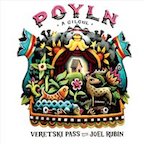 If there is a better Jewish band actively creating new traditional klezmer, I don't know of them. In this new recording, they include Joel Rubin, an equally acclaimed klezmer revival pioneer and professor. Just marvellous. Polish rural folk traditions klezmerified. Veretski Pass w/Joel Rubin / Poyln, 2015. Buy a few copies—you'll be handing them out to friends and family.
If there is a better Jewish band actively creating new traditional klezmer, I don't know of them. In this new recording, they include Joel Rubin, an equally acclaimed klezmer revival pioneer and professor. Just marvellous. Polish rural folk traditions klezmerified. Veretski Pass w/Joel Rubin / Poyln, 2015. Buy a few copies—you'll be handing them out to friends and family.
July 24, 2016
Jewlia Eisenberg: Mahmoud Darwish's "Psalm 6"
Wouldn't it be nice if this were less timely?
Published on Jul 19, 2016
Voice: Jewlia Eisenberg
Accordion: Dan Cantrell
"The trees of my country are apprentices of greenness
and I an apprentice of memory."
July 13, 2016
Dropkin releases "Lutzifer"
Jewlia Eisenberg has been talking up the poetry and stories of Yiddish writer Celia Dropkin since I've known her. I cannot tell you all how excited to hear this finally get recorded, and in such a superlative, avant-garde fashion. Check it out on Soundcloud. I can't tell, though—this might not be new, but rather, the 5-year anniversary since this was released. Dynamite, either way:
Dropkin is an avant-rock band with music by Roy Yarkoni. The lyrics are Hebrew translations of poems by the Yiddish modernist Celia Dropkin (1887-1956). Her work is intensely personal, rich with violent sexuality, intense longing, and strange explorations of family dynamics. The music, like her poetry, is ambitious, sensual, and a bit scary.
June 5, 2016
Review: David Krakauer's Ancestral Groove / Checkpoint (2016)
 To the extent that I have been tweeting the last couple of months, it has been to reflect how blown away I am by the new (to the US--released in Europe 2014) David Krakauer CD. This is the sort of CD that makes me celebrate the klezmer revival: entirely new music built on not just Eastern European roots, but also infused with jazz, funk, hip hop, and even modern classical traditions. This is what originality sounds like, but only when originality is accessible, approachable, and danceable. Let me invite you to check out David Krakauer's Ancestral Groove / Checkpoint. Available wherever good music is purchased or downloaded, or via David Krakauer's website.
To the extent that I have been tweeting the last couple of months, it has been to reflect how blown away I am by the new (to the US--released in Europe 2014) David Krakauer CD. This is the sort of CD that makes me celebrate the klezmer revival: entirely new music built on not just Eastern European roots, but also infused with jazz, funk, hip hop, and even modern classical traditions. This is what originality sounds like, but only when originality is accessible, approachable, and danceable. Let me invite you to check out David Krakauer's Ancestral Groove / Checkpoint. Available wherever good music is purchased or downloaded, or via David Krakauer's website.
June 3, 2016
naftule's dream / blood - review on NPR
Yes, there is a new Naftule's Dream CD, and NPR's Milo Miles is on it:
Naftule's Dream Returns, With A Fleshy, Folkie New Album, by Milo Miles, June 1, 2016
December 27, 2015
The blues and North African polyrhythms meet Khazones: The Sway Machinery/Purity and Danger
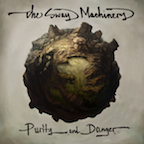
Few bands have pushed the boundary of Jewish music as hard as Jeremy Lockwood and The Sway Machinery. 2011's The House of Friendly Ghosts was a collaboration between the band and North African Rai singer Khaira Arby. The opening horns in this new release, Purity and Danger reflect that collaboration, still. The album also reflects Lockwood's background as a street blues musician ("My dead lover's wedding," with its echoes of "St. James Infirmary" or the Hound Dog Taylor-inspired distorted guitar meeting North African music and jazz in "Longa"), and the cantorial legacy of his grandfather (including very new settings to Cantorial gems ranging from Ben Zion Kapov-Kagan's "Rachamana D'Onay" and Leib Glantz's "Al Tashlicheini." This is fertile territory, and at its best, this is a fusion as astonishing as the discovery of how well Arabic music fits piyyut 1500 years ago. Available as CD or digital download from 3rd generation recordings.
Want another view? Check out Adam Kivel's review on the "Consequences of Sound" website: The Sway Machinery - Purity and Danger
I should also mention that The Sway Machinery has a new cassette EP coming out. Those interested, should check out on 3rd Generation Recordings website.
April 3, 2015
Cantor Yanky Lemmer, Frank London & Michael Winograd - Project Ahava Raba - Studio Session
Posted by Michael Winograd to Facebook
Cantor Yanky Lemmer, Frank London & Michael Winograd - Project Ahava Raba - Studio Session A prayer, a Nusach and most importantly an invocation of the the abundant love between man and his Creator. It is through this project that Cantor Yaakov Lemmer, trumpeter Frank London and clarinetist Michael Winograd elicit these emotions. The project was conceived while touring Europe and performing at various Jewish Culture festivals. It is a marriage of Klezmer, Chazzanut, with an old school feel yet a refreshening energy and vibe.December 13, 2014
Happy almost Khanike--more new Jewish music
Ack! It is almost Khanike and I still have stacks of CDs that you should know about in case you have made gift-giving part of your seasonal celebration of light. Okay, let's get short bits up about a few of them, at least.
 From the clarinet glissando that opens the first song, first echoing Gershwin, then blasting that thought out of the ears, Benjy Fox-Rosens 2011 EP Tick Tock signalled a major shift in the way we think about Yiddish songs and Mordechai Geburtig's legacy. It is totally new all over again. "Yiddish Art Song" is reborn, in a thoroughly imaginative, beautiful manner. Listen, for instance to "Grine Oygen" (Green Eyes), which quotes from several popular klezmer and yiddish cliches, turning them inside out. I can only conclude by mentioning the title of the final song on the EP: "S'iz Git"—It's Good! You can get a copy of the EP in digital or physical form via BandCamp.
From the clarinet glissando that opens the first song, first echoing Gershwin, then blasting that thought out of the ears, Benjy Fox-Rosens 2011 EP Tick Tock signalled a major shift in the way we think about Yiddish songs and Mordechai Geburtig's legacy. It is totally new all over again. "Yiddish Art Song" is reborn, in a thoroughly imaginative, beautiful manner. Listen, for instance to "Grine Oygen" (Green Eyes), which quotes from several popular klezmer and yiddish cliches, turning them inside out. I can only conclude by mentioning the title of the final song on the EP: "S'iz Git"—It's Good! You can get a copy of the EP in digital or physical form via BandCamp.
 But, I really got you here to talk about the more recent 2014 Fox-Rosen release, Two Worlds, a reflective, sad song cycle comprised of reset songs by Mordechai Gebirtig. From the opening, "When father beats me," you know that this is not a shmaltzy picture of life in the old country. What makes this essential, and I think why I can't stop listening, is how real it is. The picture is so vivid, the music so intense, that I find myself at the end and starting over. Backed by his Yiddish Art Trio bandmates Pat Ferrell on accordion and Michael Winograd on clarinet, with his brother Avi on guitar and Tyshawn Sorey on drums, Benjy Fox-Rosen's voice and bass weave the arrangements into compelling, haunting stories. His music is new. But it is new swirled with traditional Yiddish folk, theatre, and klezmer fragments, recreated to make a vanished community real again, and to tug at our hearts, to make us care about that community and their lives, anew. You can get a copy for those amazing purveyors of wonderful new sounds, Golden Horn Records.
But, I really got you here to talk about the more recent 2014 Fox-Rosen release, Two Worlds, a reflective, sad song cycle comprised of reset songs by Mordechai Gebirtig. From the opening, "When father beats me," you know that this is not a shmaltzy picture of life in the old country. What makes this essential, and I think why I can't stop listening, is how real it is. The picture is so vivid, the music so intense, that I find myself at the end and starting over. Backed by his Yiddish Art Trio bandmates Pat Ferrell on accordion and Michael Winograd on clarinet, with his brother Avi on guitar and Tyshawn Sorey on drums, Benjy Fox-Rosen's voice and bass weave the arrangements into compelling, haunting stories. His music is new. But it is new swirled with traditional Yiddish folk, theatre, and klezmer fragments, recreated to make a vanished community real again, and to tug at our hearts, to make us care about that community and their lives, anew. You can get a copy for those amazing purveyors of wonderful new sounds, Golden Horn Records.
 Looking for something smooth, jazzy, uplifting for the holiday? David Chevan's Afro-Semitic Experience has just the thing, Souls on Fire. After several recent releases that focused on Jewish cantorial tradition, this year the band turned back to its roots, presenting songs from Pharaoh Sanders, MyCoy Tyner, Duke Ellington, along with traditional Jewish klezmer, and spirituals such as "Go Down, Moses" and "Avadim Hayinu" (We were slaves), from the Passover seder. Selections also include that gospel cantor, Sister Rosetta Tharpe's "Up above my head I hear music in the air." A perfect accompaniment to quiet evenings around the menorah or even a roaring fire. You can get your copy, digital or otherwise, from cdbaby.com.
Looking for something smooth, jazzy, uplifting for the holiday? David Chevan's Afro-Semitic Experience has just the thing, Souls on Fire. After several recent releases that focused on Jewish cantorial tradition, this year the band turned back to its roots, presenting songs from Pharaoh Sanders, MyCoy Tyner, Duke Ellington, along with traditional Jewish klezmer, and spirituals such as "Go Down, Moses" and "Avadim Hayinu" (We were slaves), from the Passover seder. Selections also include that gospel cantor, Sister Rosetta Tharpe's "Up above my head I hear music in the air." A perfect accompaniment to quiet evenings around the menorah or even a roaring fire. You can get your copy, digital or otherwise, from cdbaby.com.
 It is the rare holiday season when you can celebrate with a new release by the punk Eastern European rhythms of "Golem." This is one of them, and Tanz is the most fun the band has had in years. A frenzied cross between the Brave Combo, Gogol Bordello, and your neighborhood klezmer band, Golem's songs are pleasantly twisted, the rhythms are propulsive, dance-perfect. There is a lounge music component that keeps us from taking anything too seriously. Whether telling a plaintive story of two sad sacks finding each other and falling in love ("Miskayt"), harking back to the old country and the many changing linguistic contexts of modern life in "My Horse" ("but with my faithful horse, I speak mameloshn") or telling the stories of recent immigrants to the USA from the former USSR (most notably, sadly, on "Poletim," story of a hijacking gone a bit awry), this is a wonderful burst of energy and fun. This, and other fine recordings by the band are available from their website: golemrocks.com.
It is the rare holiday season when you can celebrate with a new release by the punk Eastern European rhythms of "Golem." This is one of them, and Tanz is the most fun the band has had in years. A frenzied cross between the Brave Combo, Gogol Bordello, and your neighborhood klezmer band, Golem's songs are pleasantly twisted, the rhythms are propulsive, dance-perfect. There is a lounge music component that keeps us from taking anything too seriously. Whether telling a plaintive story of two sad sacks finding each other and falling in love ("Miskayt"), harking back to the old country and the many changing linguistic contexts of modern life in "My Horse" ("but with my faithful horse, I speak mameloshn") or telling the stories of recent immigrants to the USA from the former USSR (most notably, sadly, on "Poletim," story of a hijacking gone a bit awry), this is a wonderful burst of energy and fun. This, and other fine recordings by the band are available from their website: golemrocks.com.
 A surprising amount of wonderful new Jewish music doesn't come from European Jewish traditions. Likewise, some of the most striking new music is old, as in this recreated Sephardic wedding song cycle arranged by Aron Saltiel, Ensemble Saltiel / Boda. There seems to be no comparable cycle in Ashkenazic tradition. Saltiel has combined decades of field research, with singers and musicians familiar with the repertoire, and takes us from a celebration of the first glances, to arranging the engagement, completing the bridal trousseau to the groom presenting a gift on the wedding night. Gathered from former Ottoman lands in the Balkans and Turkey, the melodies, the singing, and the sense of tradition are fantastic. The singing features for individual solos and a powerful Sephardic chorus. The CD is beautifully packaged with notes (including a brief introduction by Dr. Judith Cohen) and images, as well as translations of all of the tunes. This is just wonderful, good-time music, all the more precious for being a rare recording based on a vanishing/vanished tradition. You can get your copy, digital or otherwise, from Golden Horn Records.
A surprising amount of wonderful new Jewish music doesn't come from European Jewish traditions. Likewise, some of the most striking new music is old, as in this recreated Sephardic wedding song cycle arranged by Aron Saltiel, Ensemble Saltiel / Boda. There seems to be no comparable cycle in Ashkenazic tradition. Saltiel has combined decades of field research, with singers and musicians familiar with the repertoire, and takes us from a celebration of the first glances, to arranging the engagement, completing the bridal trousseau to the groom presenting a gift on the wedding night. Gathered from former Ottoman lands in the Balkans and Turkey, the melodies, the singing, and the sense of tradition are fantastic. The singing features for individual solos and a powerful Sephardic chorus. The CD is beautifully packaged with notes (including a brief introduction by Dr. Judith Cohen) and images, as well as translations of all of the tunes. This is just wonderful, good-time music, all the more precious for being a rare recording based on a vanishing/vanished tradition. You can get your copy, digital or otherwise, from Golden Horn Records.
 I saved my favorite among favorites for last. César Lerner and Marcelo Moguilevsky have been creating a wonderful fusion of Jewish and South American music together for almost as long as there has been a KlezmerShack. On their most recent (first?) trip to Boston two years ago, they brought Alef Bet, their most fully realized recording, yet. The album features their patented interplay between woodwinds and percussion/piano. Listen to Moguilevsky turn a simple "Zhok," first on flute?, and then Lerner's piano response, and then they begin improvising. "Una Luz" opens with quite, sparse chords by Lerner, and continues quietly exploring until the rapid pace of "Popurri" picks up Moguilevsky's clarinet and then the two are off, conversing wildly, excitedly, again. This is a quieter, more sure recording than their earlier efforts. It is less "klezmer-jazz fusion" and more it's own modern music in which one discerns strains of many things, but mostly, two musicians who have been sharing their conversations for decades, and who continue to find new, deeper, always-satisfying things to say to each other. Listening to Marcelo's whistling, as Lerner's piano walks quietly beside on the closing "Part of me," best expresses how far they have come, and how much richer our ears have been for the journey. Better, the days when ordering their CDs meant finding one's way in an Argentinian website and fantastic shipping charges are over. You can get this, and other recordings, directly from iTunes or Amazon.com
I saved my favorite among favorites for last. César Lerner and Marcelo Moguilevsky have been creating a wonderful fusion of Jewish and South American music together for almost as long as there has been a KlezmerShack. On their most recent (first?) trip to Boston two years ago, they brought Alef Bet, their most fully realized recording, yet. The album features their patented interplay between woodwinds and percussion/piano. Listen to Moguilevsky turn a simple "Zhok," first on flute?, and then Lerner's piano response, and then they begin improvising. "Una Luz" opens with quite, sparse chords by Lerner, and continues quietly exploring until the rapid pace of "Popurri" picks up Moguilevsky's clarinet and then the two are off, conversing wildly, excitedly, again. This is a quieter, more sure recording than their earlier efforts. It is less "klezmer-jazz fusion" and more it's own modern music in which one discerns strains of many things, but mostly, two musicians who have been sharing their conversations for decades, and who continue to find new, deeper, always-satisfying things to say to each other. Listening to Marcelo's whistling, as Lerner's piano walks quietly beside on the closing "Part of me," best expresses how far they have come, and how much richer our ears have been for the journey. Better, the days when ordering their CDs meant finding one's way in an Argentinian website and fantastic shipping charges are over. You can get this, and other recordings, directly from iTunes or Amazon.com.
December 1, 2014
Five excellent mostly new recordings for holiday gift-giving
It is already after Thanksgiving and I haven't had time to make any additional dents in the pile of CDs that you =should= be considering for holiday gifts. Okay, I'll try to give some brief reviews of some of the essential new (mostly new) recordings:
 I used to think of Isle of Klezbos as the lesser cousin of Metroplitan Klezmer, both anchored by drummer Eve Sicular, and both featuring many of the same musicians. But Live from Brooklyn shows that Isle of Klezbos is one of the premiere purveyors of that American form of klezmer: jazzy, brash, full of yiddish theatre songs and great dance music. This one is for the dancer in the house. You can get your copy right on CDbaby.com. Bonus: Order this between now and 12/3/14 midnight, and shipping is free.
I used to think of Isle of Klezbos as the lesser cousin of Metroplitan Klezmer, both anchored by drummer Eve Sicular, and both featuring many of the same musicians. But Live from Brooklyn shows that Isle of Klezbos is one of the premiere purveyors of that American form of klezmer: jazzy, brash, full of yiddish theatre songs and great dance music. This one is for the dancer in the house. You can get your copy right on CDbaby.com. Bonus: Order this between now and 12/3/14 midnight, and shipping is free.
 Folklorist, singer, dancer Michael Alpert has been sharing a stage with Julian Kytasty for many years. One sings in Yiddish. The other in Ukrainian. Together they weave together two folk cultures in a beautiful acoustic set, Night songs from a neighboring village. Appropriately timed, given Ukraine's prominence in recent news, this one will leave you feeling all sweet inside—except for "Homebrew," which will encourage you to eschew the store-bought stuff and drink local. I remember the tune as Irish, but what do I know. What a great way to celebrate 20 amazing years of music from Oriente records.
Folklorist, singer, dancer Michael Alpert has been sharing a stage with Julian Kytasty for many years. One sings in Yiddish. The other in Ukrainian. Together they weave together two folk cultures in a beautiful acoustic set, Night songs from a neighboring village. Appropriately timed, given Ukraine's prominence in recent news, this one will leave you feeling all sweet inside—except for "Homebrew," which will encourage you to eschew the store-bought stuff and drink local. I remember the tune as Irish, but what do I know. What a great way to celebrate 20 amazing years of music from Oriente records.
 I first noticed Zisl Slepovitch because of his brilliant "Minsker Kapelye" CD. But, that was back in the old country. Arriving here in the US, he formed a new ensemble, Litvakus, and presented the unique repertoire of Belarusian Jews as a thing of beauty. This is a pre-American jazz form of klezmer, along with nign and folksong. Raysn is a recording of unadorned beauty. I am in awe. Available online from Bandcamp.
I first noticed Zisl Slepovitch because of his brilliant "Minsker Kapelye" CD. But, that was back in the old country. Arriving here in the US, he formed a new ensemble, Litvakus, and presented the unique repertoire of Belarusian Jews as a thing of beauty. This is a pre-American jazz form of klezmer, along with nign and folksong. Raysn is a recording of unadorned beauty. I am in awe. Available online from Bandcamp.
 Although you are less likely to hear cantorial music, much less good cantorial music in the synagogue today than even when I was young, one compensation is the myriad of ways in which cantorial music is being recontextualized. Some stylings are more tuneful and gentle, as in Frank London's cantorial music albums. Other artists, like Jeremiah Lockwood of The Sway Machinery have been louder and more discordant. Here, Tzadik recording artist, guitarist Yoshie Fruchter (also the grandson of a cantor) has reimagined and recontextualized some cantorial gems. Some are rendered as instrumentals, with his searing guitar replacing the cantorial sobbing of a hundred years ago. I find myself, in particular, drawn to his reimagination of the "Rosh Hashanah"" plea.In a few cases, he mixed original recordings in with his new musical settings, or sings the music, himself. The result is a loud, discordant, and ultimately immensely spiritual CD. Check out Schizophonia / Cantorial recordings reimagined and get copies for the musical explorers on your gift list. Available from Bandcamp.
Although you are less likely to hear cantorial music, much less good cantorial music in the synagogue today than even when I was young, one compensation is the myriad of ways in which cantorial music is being recontextualized. Some stylings are more tuneful and gentle, as in Frank London's cantorial music albums. Other artists, like Jeremiah Lockwood of The Sway Machinery have been louder and more discordant. Here, Tzadik recording artist, guitarist Yoshie Fruchter (also the grandson of a cantor) has reimagined and recontextualized some cantorial gems. Some are rendered as instrumentals, with his searing guitar replacing the cantorial sobbing of a hundred years ago. I find myself, in particular, drawn to his reimagination of the "Rosh Hashanah"" plea.In a few cases, he mixed original recordings in with his new musical settings, or sings the music, himself. The result is a loud, discordant, and ultimately immensely spiritual CD. Check out Schizophonia / Cantorial recordings reimagined and get copies for the musical explorers on your gift list. Available from Bandcamp.
 This last mention for tonight is from a recording that has been sitting on the review shelf for too long. I was reminded of it with a pang last night when I listened to Andy Statman play at a local club. Statman is famous for mixing klezmer and hassidic music and bluegrass so seamlessly that it isn't so much a melding of genres, but a fluency so natural, that all genres sound like facets of the same universal harmonies. That's what the Freilachmakers do with their blend of various Jewish music, starting with klezmer, and with Irish music. Intriguingly, this third recording, Klezmer at the confluence by the ensemble is all Jewish in source: klezmer, yiddish, ladino. But, I am happy to say that the Irish is also still present. Another very special recording from a very special band. This one goes to the persons on your list who don't yet know that klezmer is another way of speaking Irish. Get your copy(ies) from cdbaby.com.
This last mention for tonight is from a recording that has been sitting on the review shelf for too long. I was reminded of it with a pang last night when I listened to Andy Statman play at a local club. Statman is famous for mixing klezmer and hassidic music and bluegrass so seamlessly that it isn't so much a melding of genres, but a fluency so natural, that all genres sound like facets of the same universal harmonies. That's what the Freilachmakers do with their blend of various Jewish music, starting with klezmer, and with Irish music. Intriguingly, this third recording, Klezmer at the confluence by the ensemble is all Jewish in source: klezmer, yiddish, ladino. But, I am happy to say that the Irish is also still present. Another very special recording from a very special band. This one goes to the persons on your list who don't yet know that klezmer is another way of speaking Irish. Get your copy(ies) from cdbaby.com.
October 18, 2014
Two different takes on Jewish music and Americana: Koby Israelite and Ezekiel's Wheel

I have reviewed early Koby Israelite releases on these pages, and always with delight. But this latest, which includes some wonderful Americana, along with his usual patented remixing of world traditional music from all over (including a classic version of Bob Dylan's "Subterranean Homesick Blues," perhaps arranged as only an Israeli exile in London can). If you haven't heard of Israelite, or haven't yet heard Blues from elsewhere, you are in for a treat.

The only thing sad about Ezekiel's Wheels first full-length release is that it has taken me a year to get it online. A traditional American klezmer band, the Wheels seem to infuse everything with a special energy. Their arrangements, even their newer compositions, are so much a part of the traditional approach to klezmer without foregoing what it means to be an American band making Ashkenazic Jewish simkhe music. They don't just sound special as a band, but in person they still seem special. This is the best capturing of that soul, so far, Transported
October 12, 2014
Zion80, Ichka, Lemon Bucket Orchestra, Lenka Lichtenberg/Yair Dalal - save the best for last from Ashkenaz 2014
So, we're just about at the end of my writing about the Ashkenaz 2014 fest and what I saw and heard there. Just a few more bands/releases to cover. Bear with me. I've kind of saved the best for last, so you wouldn't all go away.
The first full evening of the festival was Saturday night. As festival director Eric Stein noted, every act playing Saturday night was Canadian. That already makes Ashkenaz special. Beyond the rare incursion by some of the Montreal bands, you wouldn't think from sitting here in Boston that there was Jewish music, much less new Jewish music in Canada at all.
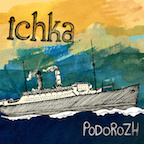 One of the key ingredients of the festival is the ongoing dancing. This year, the band that did most of the playing for that dancing was a Montreal band, Ichka, that has also done some minor touring—they were even south of the border, here in Boston on a double bill with local favorites Ezekiel's Wheels last winter. They are a powerful, brassy ensemble that remind me in some ways of the venerable Dutch band, Di Gojim. Ichka is young and they play with excellence and fervor. Their first release, Podorozh, captures the contemporary North American klezmer sound: Not only familiar songs such as "Nifty's Freylakhs" or "Fun Tashlikh," but updated to include Steven Greenman's excellent "Dreaming of Goldenshteyn," a delightful "Glazier's Hora" from Alicia Svigals, and best of all, reaching across the pond to capture "the Tongue," by Merlin Shepherd (who, as already mentioned, was also at Ashkenaz with wife, singer/piano player, Polina Shepherd). Opening with a fantastic drumroll and a fantastic blaring of horns, this is both a blast from the past, and a statement about keeping the dancing speaking to us. If you were't at Ashkenaz, you can get your CD or MP3s from bandcamp.
One of the key ingredients of the festival is the ongoing dancing. This year, the band that did most of the playing for that dancing was a Montreal band, Ichka, that has also done some minor touring—they were even south of the border, here in Boston on a double bill with local favorites Ezekiel's Wheels last winter. They are a powerful, brassy ensemble that remind me in some ways of the venerable Dutch band, Di Gojim. Ichka is young and they play with excellence and fervor. Their first release, Podorozh, captures the contemporary North American klezmer sound: Not only familiar songs such as "Nifty's Freylakhs" or "Fun Tashlikh," but updated to include Steven Greenman's excellent "Dreaming of Goldenshteyn," a delightful "Glazier's Hora" from Alicia Svigals, and best of all, reaching across the pond to capture "the Tongue," by Merlin Shepherd (who, as already mentioned, was also at Ashkenaz with wife, singer/piano player, Polina Shepherd). Opening with a fantastic drumroll and a fantastic blaring of horns, this is both a blast from the past, and a statement about keeping the dancing speaking to us. If you were't at Ashkenaz, you can get your CD or MP3s from bandcamp.
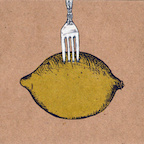 Joining Ichka on its debut album was the Lemon Bucket Orkestra, one of Toronto's best street orchestras. You don't know from street orchestras? Somewhere, in an urban area near you there is a festival called "Honk!" featuring these popular, often-amateur ensembles from around the world. (Boston's was held this weekend, in fact!) Lemon Bucket is famed for calling out the band to play in an Assisted Living home, or to accompany a good protest. At Ashkenaz, they headlined on Saturday night, exciting the largest crowd I saw during the festival with incredible energy, precision, and a scintillating mix of klezmer, balkan, and whatever else they felt like playing. Their new recording, Lume Lume has the frenetic mix you would expect, with tunes from all over Eastern Europe, Jewish and otherwise. They close with one of my favorites, "7:40." Back towards the beginning of the klezmer revival, this was recorded by everyone. We all moved on. I am greatful to the Lemon Buckets for bringing it back, and for having so much fun playing. You can find out more and get your own copy (CD or MP3) from their bandcamp page.
Joining Ichka on its debut album was the Lemon Bucket Orkestra, one of Toronto's best street orchestras. You don't know from street orchestras? Somewhere, in an urban area near you there is a festival called "Honk!" featuring these popular, often-amateur ensembles from around the world. (Boston's was held this weekend, in fact!) Lemon Bucket is famed for calling out the band to play in an Assisted Living home, or to accompany a good protest. At Ashkenaz, they headlined on Saturday night, exciting the largest crowd I saw during the festival with incredible energy, precision, and a scintillating mix of klezmer, balkan, and whatever else they felt like playing. Their new recording, Lume Lume has the frenetic mix you would expect, with tunes from all over Eastern Europe, Jewish and otherwise. They close with one of my favorites, "7:40." Back towards the beginning of the klezmer revival, this was recorded by everyone. We all moved on. I am greatful to the Lemon Buckets for bringing it back, and for having so much fun playing. You can find out more and get your own copy (CD or MP3) from their bandcamp page.
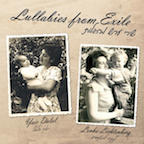 As part of my introduction to the artists playing at Ashkenaz, I mentioned Lenka Lichtenberg's recent CD, Songs for the breathing walls. She was at Ashkenaz to promote a new, just-released project, an album of lullabies which she has put together with Iraqi-Israeli artist Yair Dalal. Lullabies from Exile presents lullabies from both European and Mizrahi Jewish traditions. Featuring the gentle voices of both, as well as Dalal's wonderful oud, and backed by an excellent ensemble, this is the children's recording of the festival. Soothing and gentle, and drawing from so many Jewish traditions (and their overlap), it is a pleasure. Check out Lichtenberg's website for your own copy and for more info.
As part of my introduction to the artists playing at Ashkenaz, I mentioned Lenka Lichtenberg's recent CD, Songs for the breathing walls. She was at Ashkenaz to promote a new, just-released project, an album of lullabies which she has put together with Iraqi-Israeli artist Yair Dalal. Lullabies from Exile presents lullabies from both European and Mizrahi Jewish traditions. Featuring the gentle voices of both, as well as Dalal's wonderful oud, and backed by an excellent ensemble, this is the children's recording of the festival. Soothing and gentle, and drawing from so many Jewish traditions (and their overlap), it is a pleasure. Check out Lichtenberg's website for your own copy and for more info.
 Finally, we come to my personal favorite, Sunday night's headline band, Zion 80, jazz guitarist/Tzadik recording artist Jon Madof's recent project merging the AfroPop sounds of Fela Kuti with the melodies of Shlomo Carlebach. While that original project was a wall of danceable, infectious nign, this concert highlighted material from the new release, Adramelech: The book of angels, vol. 22 featuring Madof's arrangements of John Zorn tunes from "The Book of Angels." The band isn't much smaller than the Lemon Bucket Orchestra, and took Jewish music to another continent entirely. If you don't have both of the Zion 80 releases, time to catch up. But, I also have to express my pleasure and delight especially at the new release. Available, of course, from Tzadik Records. Enjoy. Same time, same place, in two years for the next Ashkenaz Festival?
Finally, we come to my personal favorite, Sunday night's headline band, Zion 80, jazz guitarist/Tzadik recording artist Jon Madof's recent project merging the AfroPop sounds of Fela Kuti with the melodies of Shlomo Carlebach. While that original project was a wall of danceable, infectious nign, this concert highlighted material from the new release, Adramelech: The book of angels, vol. 22 featuring Madof's arrangements of John Zorn tunes from "The Book of Angels." The band isn't much smaller than the Lemon Bucket Orchestra, and took Jewish music to another continent entirely. If you don't have both of the Zion 80 releases, time to catch up. But, I also have to express my pleasure and delight especially at the new release. Available, of course, from Tzadik Records. Enjoy. Same time, same place, in two years for the next Ashkenaz Festival?
September 28, 2014
New releases for the Days of Awe
I want to take time out for a few minutes to note the current season and mention a few recent releases that may help get you in the mood for t'shuvah.
 I'll first mention a new instrumental release by Tzadik saxophonist Paul Shapiro / Shofarot Verses. His 2003 "Midnight Minyan" put the daven into jazz. Here he continues that tradition, with some of my favorite Tzadik musicians, including Captain Beefheart alum Marc Ribot on guitar, Brad Jones on bass, and Tony Lewis on drums. From the opening moments of the very season-appropriate "Hashivenu" through the closing "With Reed and Skins" Shapiro manages to combine jazz and a sense of nusach (Ashkenazic Jewish cantorial modes) in ways that seek out that still small voice within us. At the same time, as on "Daven Dance," he reminds us that joy can physically move us. The shofar-like soprano sax impulsion on "Halil," with Ribot's answering guitar is one standout, followed by an actual shofar on "Ashamnu," which takes the familiar Yom Kippur melody to a new place of grace. The album's ethos is perhaps best expressed in the description of "Search your soul," "Finding solace in the house of b-flat." More info at Paul's website. The music is available from Tzadik and the usual disk and MP3 vendors online.
I'll first mention a new instrumental release by Tzadik saxophonist Paul Shapiro / Shofarot Verses. His 2003 "Midnight Minyan" put the daven into jazz. Here he continues that tradition, with some of my favorite Tzadik musicians, including Captain Beefheart alum Marc Ribot on guitar, Brad Jones on bass, and Tony Lewis on drums. From the opening moments of the very season-appropriate "Hashivenu" through the closing "With Reed and Skins" Shapiro manages to combine jazz and a sense of nusach (Ashkenazic Jewish cantorial modes) in ways that seek out that still small voice within us. At the same time, as on "Daven Dance," he reminds us that joy can physically move us. The shofar-like soprano sax impulsion on "Halil," with Ribot's answering guitar is one standout, followed by an actual shofar on "Ashamnu," which takes the familiar Yom Kippur melody to a new place of grace. The album's ethos is perhaps best expressed in the description of "Search your soul," "Finding solace in the house of b-flat." More info at Paul's website. The music is available from Tzadik and the usual disk and MP3 vendors online.
 Coming from another place, entirely, (and perhaps exemplifying the difference between the gritty downtown New York scene vs. the spiritual secularism of California's Bay Area) singer/cantor Linda Hirschhorn's voice and words speak directly to those parts of us that aspire to heal and to help a world in need of healing. Her 2013 recording, "Amazed" is also an album with beautiful personal love songs. With an all-star cast, including Holly Near on the backing vocals of the opening hymn, "Amazed," this is just a wonderful album, balm for a "verbissener velt." Tunes range from the folkie to the blues, as on "Some Love," to the hum along inspirational and aspirational, as "Give it all you have." You can listen to samples and purchase the CD from Linda Hirschhorn's website and the usual online vendors.
Coming from another place, entirely, (and perhaps exemplifying the difference between the gritty downtown New York scene vs. the spiritual secularism of California's Bay Area) singer/cantor Linda Hirschhorn's voice and words speak directly to those parts of us that aspire to heal and to help a world in need of healing. Her 2013 recording, "Amazed" is also an album with beautiful personal love songs. With an all-star cast, including Holly Near on the backing vocals of the opening hymn, "Amazed," this is just a wonderful album, balm for a "verbissener velt." Tunes range from the folkie to the blues, as on "Some Love," to the hum along inspirational and aspirational, as "Give it all you have." You can listen to samples and purchase the CD from Linda Hirschhorn's website and the usual online vendors.
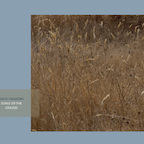 Siach Hasadeh is a Montreal-based duo, clarinet and bass, exploring Jewish niggun. Since they also appeared at Ashkenaz 2014, I can also link this set of reviews to my continuing coverage of the standout artists at that festival. Although the music is sweet, the duo explores the rougher sides of harmony as well. There is a delightful tone poem/art song/modern classical dissonance that weaves in and out of these tunes, from the opening "R' Levi Yitzchak Berditchever's Niggun" to "Niggun firn di tsaddikim in gay eyden" or "Rabbeinu's Niggun" featuring Shtreiml masters Jason Rosenblatt on harmonica and Ismail Fencioğlu on oud. For those who enjoy digging deeper and letter ways of niggun wash over them, this is a rich recording. You can read more about the recording on the band's website or purchase it directly from CDBaby.com.
Siach Hasadeh is a Montreal-based duo, clarinet and bass, exploring Jewish niggun. Since they also appeared at Ashkenaz 2014, I can also link this set of reviews to my continuing coverage of the standout artists at that festival. Although the music is sweet, the duo explores the rougher sides of harmony as well. There is a delightful tone poem/art song/modern classical dissonance that weaves in and out of these tunes, from the opening "R' Levi Yitzchak Berditchever's Niggun" to "Niggun firn di tsaddikim in gay eyden" or "Rabbeinu's Niggun" featuring Shtreiml masters Jason Rosenblatt on harmonica and Ismail Fencioğlu on oud. For those who enjoy digging deeper and letter ways of niggun wash over them, this is a rich recording. You can read more about the recording on the band's website or purchase it directly from CDBaby.com.
 The standout voice, the woman everyone wanted to hear at this year's Ashkenaz Festival was Polina Shepherd. Readers of these pages over the years will not be surprised—you have read reviews of her singing with choirs, with brass bands, with just her husband, Merlin Shepherd, and friends. She plays an amazing piano, but it is her voice that you notice. Amazing range. Beauty, and a force of nature. Born in the former Soviet Union, this recording is a tribute to both her Russian and Yiddish roots. She sings of love and longing, universal yearnings, whether, say, in the Russian "Silver Birch" or the more modern Yiddish of "Birch Tree;" from folk melodies, to Eastern European "scat," here a wordless prayer in "Ay Yay Yay;" whether the text comes from the Song of Songs, "Place me like a seal," her own poetry (most of these pieces), or evokes life, itself, in the Yom Kippur plea, "Avinu Malkeinu" (Our Father, Our King). Shepherd's voice is transformative. More information, and CD purchases from the artist's website.
The standout voice, the woman everyone wanted to hear at this year's Ashkenaz Festival was Polina Shepherd. Readers of these pages over the years will not be surprised—you have read reviews of her singing with choirs, with brass bands, with just her husband, Merlin Shepherd, and friends. She plays an amazing piano, but it is her voice that you notice. Amazing range. Beauty, and a force of nature. Born in the former Soviet Union, this recording is a tribute to both her Russian and Yiddish roots. She sings of love and longing, universal yearnings, whether, say, in the Russian "Silver Birch" or the more modern Yiddish of "Birch Tree;" from folk melodies, to Eastern European "scat," here a wordless prayer in "Ay Yay Yay;" whether the text comes from the Song of Songs, "Place me like a seal," her own poetry (most of these pieces), or evokes life, itself, in the Yom Kippur plea, "Avinu Malkeinu" (Our Father, Our King). Shepherd's voice is transformative. More information, and CD purchases from the artist's website.
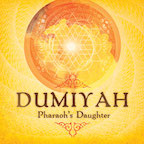
There has been an evolution as Basya Schechter has gone from writing Middle Eastern-inflected folksongs, to someone more involved with rethinking religious poetry. He most recent CD was a recording of her settings of love poems, both to women, and to God (and sometimes, like "Song of Songs," as easily to read as expressing love for both) written in Yiddish by Rabbi A. J. Heschel. This latest recording by Pharaoh's Daughter consists entirely of settings of traditional prayer and piyyut. The music, though, comes from around the world. The opening "Adon Olam" conveys echoes of electronica. The familiar "Maoz Tzur" is rethought with celesta-like keyboard pinpoints, as though to highlight falling snow; in the simplicity of the melody you can hear echoes of a family lighting Hanukkah candles. Likewise, "Ha-nerot Halaluh" contains elements of electronica and metallic percussion and a lively sing-along melody. The title song, for instance, "Dumiya," echoes all of the above, with hints of African rhythm and Middle Eastern flow. The closing "Shebishlifleynu" has a driving, somewhat psychedelic beat. The current season is evoked with light glissando's of sound setting "Zikaron," a poem conveying the awe of standing in front of G-d on Yom Kippur, with a quieter new melody for "P'tach lanu sha'ar" (open a gate for us). If the music of Shlomo Carlebach and Debbie Friedman simplified melodies and invited congregational participation in davenning in new ways, the music of Basya Schechter and Pharaoh's Daughter fuses Sephardic, Ashkenazic, and indeed, world music traditions for a new generation of prayers. It is good to hear such eloquent settings for songs of renewal in this season of awe. Liner notes and more info available on the Pharaoh's Daughter website. You can purchase a copy from Amazon.com
.
May 22, 2014
Cantorial recordings re-imagined
This latest Yoshie Fruchter project needs help on Kickstarter. I'm in. How about you?
Schizophonia is an exploration of cantorial music found on 20th century recordings and re-imagined through a contemporary lens.
March 27, 2014
David Krakauer's "Akoka"
 At the beginning of WWII, Olivier Messiaen was in the French army, and was taken prisoner of war. People less philistine than I consider it one of the premier pieces of 20th century music, and it premiered in Stalag 8-A on Jan 15, 1941 with Messiaen on piano, and three other musicians—one of them a Jewish clarinetist, Henri Akoka. There is a stunning description of the circumstances under which the piece was written and premiered in a new novel, Orfeo by one of my favorite authors, Richard Price. It may be the best section, and one that best illuminates what Powers is trying to say with the novel. (The one Jewish music connection to this piece, perhaps? Partly as a result of being part of that quartet of musicians, with missteps and near-transports along the way, Henri Akoka survived the war.)
At the beginning of WWII, Olivier Messiaen was in the French army, and was taken prisoner of war. People less philistine than I consider it one of the premier pieces of 20th century music, and it premiered in Stalag 8-A on Jan 15, 1941 with Messiaen on piano, and three other musicians—one of them a Jewish clarinetist, Henri Akoka. There is a stunning description of the circumstances under which the piece was written and premiered in a new novel, Orfeo by one of my favorite authors, Richard Price. It may be the best section, and one that best illuminates what Powers is trying to say with the novel. (The one Jewish music connection to this piece, perhaps? Partly as a result of being part of that quartet of musicians, with missteps and near-transports along the way, Henri Akoka survived the war.)
I have been listing to an old RCA recording of "The Quartet for the End of Time" for the last couple of months, ever since reading about it in the novel. I had purchased the recording after reading Alex Ross' incredible book on 20th century music, All the rest is noise," a few years ago, and quite frankly, hadn't gotten into it. That has changed.
Now, things have changed again. David Krakauer has released a new recording of the quartet, framed by short pieces composed by himself ("Akoka") and digital re-mix wizard, SoCalled ("Meanwhile...."). It includes Krakauer on clarinet, SoCalled on electronics, Matt Haimovitz on cello, Jonathan Crow on violin, and Geoffrey Burleson on piano. It is stunning. It will officially release on April 1, and if you are at all interested in amazing once-avant garde music, this is a must-purchase. It has replaced (mostly) my older recording. As intended, this is the "Quartet for the end of time" for our time.
The recording is available from Oxingale Music, oxingalerecords.com/2014/02/22/akoka/.
September 12, 2013
Zion80 CD release celebrated w/video
Jon Madof recollects a summer celebrating the release of the Zion80 recording (Carlebach meets African beats) with these videos:
From Krakov Jewish Culture Festival:
Jazzfestival Saalfelden, Austria:
You can get your copy of the CD from Tzadik Records
August 25, 2013
new from Auris Media in Israel, plus Tim Sparks, Freylekh Trio, and 3 Leg Torso
There is an amazing label in Israel, Auris Media, putting out delicious, noisy, mashed-up fusion music. I got my latest fix this week, so let me give you all a quick rundown as I get ready to spend more time listening. I'll also put up links as to how to get these—the Auris Media website is the latest of my favorite vendors to suffer misfortune. In their case, most of the most recent CDs are not listed (or order-able online), although there is an active concert listing for those in Israel. I should also mention that if you purchase physical media, you are getting beautiful packages. This label is a labor of love. For those of us who treasure non-commercial music, Auris Media is a treasure.
 Long-time readers of this site will be familiar with "Kruzenshtern and Parohod," a punk/avant-garde-ish band from Tel Aviv. More on them, anon. Most important at the moment is that they have completed two recent EP recordings with fellow-travelers, Vialka, from France. The combined band is know as the "KiV Orchestra." I love it!
Long-time readers of this site will be familiar with "Kruzenshtern and Parohod," a punk/avant-garde-ish band from Tel Aviv. More on them, anon. Most important at the moment is that they have completed two recent EP recordings with fellow-travelers, Vialka, from France. The combined band is know as the "KiV Orchestra." I love it!  Each of these recordings contains only five songs. It's as if the US punk-klezmer-balkan band, Golem moved even more extreme (and lost the klezmer), or if soulmates "Painted Bird" likewise amped up the noise and added French and Russian. Heck. "After Hostilities Ended" from Extension could have come from Daniel Kahn if they'd only sung it in Yiddish! KiV is a noise circus coupled with the amazing vocals of Marylise Frecheville. From the press release: "… a twisted version of Berlin 1920s cabaret into broken tango chansons, outsider's music from the Balkan and traditional Russian prisoner's songs. All these different styles and flavors mixed together with tons of black humor and a tough punk attitude." Get your recordings on iTunes, or from the Vialka website: www.vialka.com. Whatever hyperbole follows about other recordings? It may be true, but this is what has captured my listening time since its arrival. Extra kudos for "This is Not Tradition" on the LaRoue EP. You can also get most of the contents of the two EPs on a new release on LP/MP3: Whole.
Each of these recordings contains only five songs. It's as if the US punk-klezmer-balkan band, Golem moved even more extreme (and lost the klezmer), or if soulmates "Painted Bird" likewise amped up the noise and added French and Russian. Heck. "After Hostilities Ended" from Extension could have come from Daniel Kahn if they'd only sung it in Yiddish! KiV is a noise circus coupled with the amazing vocals of Marylise Frecheville. From the press release: "… a twisted version of Berlin 1920s cabaret into broken tango chansons, outsider's music from the Balkan and traditional Russian prisoner's songs. All these different styles and flavors mixed together with tons of black humor and a tough punk attitude." Get your recordings on iTunes, or from the Vialka website: www.vialka.com. Whatever hyperbole follows about other recordings? It may be true, but this is what has captured my listening time since its arrival. Extra kudos for "This is Not Tradition" on the LaRoue EP. You can also get most of the contents of the two EPs on a new release on LP/MP3: Whole.
 Igor Krutogolov and his fellow Tel Aviv-niks have been busy. I captured a short set of theirs a couple years ago on the KlezmerShack channel on YouTube which contains some material ("Koshka") from the most recent release, Hidden Album. The band (the origins of whose name resides in Russian irony; no duo, no Kruzenshtern, no Parohod) is now up to four members since the addition of accordionist Boris Martinovsky, the "Michael McLaughlin of the Israeli avant garde." What they haven't lost is intensity.
Igor Krutogolov and his fellow Tel Aviv-niks have been busy. I captured a short set of theirs a couple years ago on the KlezmerShack channel on YouTube which contains some material ("Koshka") from the most recent release, Hidden Album. The band (the origins of whose name resides in Russian irony; no duo, no Kruzenshtern, no Parohod) is now up to four members since the addition of accordionist Boris Martinovsky, the "Michael McLaughlin of the Israeli avant garde." What they haven't lost is intensity.  Going back a bit further to what is new to me is Noize 2005. With one song arranged by John Zorn, and that aforementioned intensity (and even without Martinovsky's accordion) the band reminds me a lot of my local Boston homies, Naftule's Dream, with an eclectic avant garde, anarchic-sounding intricately-arranged set of boundary-pushing punk-inflected soundscapes. That may be the longest string of compound adjectives I've used in a while. This isn't simple music (nor music for simple people ;-)). But unlike a lot of such music, these guys have their instruments attuned to something special. I may be listening to KiV Orchestra more, this week, because it is entirely new, but these two CDs will stay out with their brothers for a long while. Get your copies directly from iTunes, or from band camp.
Going back a bit further to what is new to me is Noize 2005. With one song arranged by John Zorn, and that aforementioned intensity (and even without Martinovsky's accordion) the band reminds me a lot of my local Boston homies, Naftule's Dream, with an eclectic avant garde, anarchic-sounding intricately-arranged set of boundary-pushing punk-inflected soundscapes. That may be the longest string of compound adjectives I've used in a while. This isn't simple music (nor music for simple people ;-)). But unlike a lot of such music, these guys have their instruments attuned to something special. I may be listening to KiV Orchestra more, this week, because it is entirely new, but these two CDs will stay out with their brothers for a long while. Get your copies directly from iTunes, or from band camp.
 Russian rapper/singer Psoy Korolenko is a treasure. In his second outing with Israel's premier klezmer band, Oy Division, Psoy Division / Dicunt he spreads anarchy and good feelings far and wide. It is easy to imagine, in fact, a delightful concert featuring this lineup and the earlier-reviewed KiV Orchestra. I'd go a long way to hear them all live. This is a reasonable place to listen in the meantime. As on his earlier recording with Daniel Kahn (just a few sentences from now), Psoy is mashing up Russian, Yiddish, Hebrew, klezmer, and rap, all to wondrous effect. There is even an excellent cover of Daniel Kahn's recent "Love Lays Low." But, here he is messing more directly with traditional folk traditions, ranging from Russian to Hasidic. I have attitude. I love it when really good musicians mess with things.
Russian rapper/singer Psoy Korolenko is a treasure. In his second outing with Israel's premier klezmer band, Oy Division, Psoy Division / Dicunt he spreads anarchy and good feelings far and wide. It is easy to imagine, in fact, a delightful concert featuring this lineup and the earlier-reviewed KiV Orchestra. I'd go a long way to hear them all live. This is a reasonable place to listen in the meantime. As on his earlier recording with Daniel Kahn (just a few sentences from now), Psoy is mashing up Russian, Yiddish, Hebrew, klezmer, and rap, all to wondrous effect. There is even an excellent cover of Daniel Kahn's recent "Love Lays Low." But, here he is messing more directly with traditional folk traditions, ranging from Russian to Hasidic. I have attitude. I love it when really good musicians mess with things.  For those who need their "messing" more political, I've had Daniel Kahn, Psoy Korolenko, Oy Division / The Unternationale in the "listening, must review soon" pile for a couple of years, but haven't gotten a mention online. More shame, me. From the echoes of "Sympathy for the Devil" on the opening "Rakhmones afn tayvl" in Russian and Yiddish with its brilliant klezmer sound, this recording is delightful. The irony of sitting in Jerusalem and refighting the battles between the Zionists and Bundists (exemplified by a cover of the 1931 Beregovski recording, "Oy, ir narishe tsienistn"), plus the usual counterspin on life, politics make this a recording that is not just fun to hear, but fun to listen to closely Psoy's anti-cleric rap in the middle of the traditional Russian "Ekh Lyuli Lyuli" is worth the price of admission all on its own.
For those who need their "messing" more political, I've had Daniel Kahn, Psoy Korolenko, Oy Division / The Unternationale in the "listening, must review soon" pile for a couple of years, but haven't gotten a mention online. More shame, me. From the echoes of "Sympathy for the Devil" on the opening "Rakhmones afn tayvl" in Russian and Yiddish with its brilliant klezmer sound, this recording is delightful. The irony of sitting in Jerusalem and refighting the battles between the Zionists and Bundists (exemplified by a cover of the 1931 Beregovski recording, "Oy, ir narishe tsienistn"), plus the usual counterspin on life, politics make this a recording that is not just fun to hear, but fun to listen to closely Psoy's anti-cleric rap in the middle of the traditional Russian "Ekh Lyuli Lyuli" is worth the price of admission all on its own.
 If you have stuck it out this far, you must be wondering if the KlezmerShack is ever going to review, say, klezmer again. Is there something on my review pile that is just plain pleasant to listen to, but also worth listening to? So, I'll conclude today's mini-reviews with a mention of Le Freylekh Trio / featuring Goulash System". As Tim put it in his most recent nudge, "One of the coolest bands in Paris. Klezmer-Gypsy-Balkan-African...
The sounds of Menilmontant and La Goutte D'Or!" Easy for him to say. He's featured on this recording. If you like Django Reinhardt and jazz that swings, if you like Gypsy and klezmer music, if you just like great guitar and playing, plus wonderful vocals, then this is the recording to listen to. On this recording, the basic guitar-fiddle-bass are joined by a host of others. You can check out the recording on soundcloud.
If you have stuck it out this far, you must be wondering if the KlezmerShack is ever going to review, say, klezmer again. Is there something on my review pile that is just plain pleasant to listen to, but also worth listening to? So, I'll conclude today's mini-reviews with a mention of Le Freylekh Trio / featuring Goulash System". As Tim put it in his most recent nudge, "One of the coolest bands in Paris. Klezmer-Gypsy-Balkan-African...
The sounds of Menilmontant and La Goutte D'Or!" Easy for him to say. He's featured on this recording. If you like Django Reinhardt and jazz that swings, if you like Gypsy and klezmer music, if you just like great guitar and playing, plus wonderful vocals, then this is the recording to listen to. On this recording, the basic guitar-fiddle-bass are joined by a host of others. You can check out the recording on soundcloud.
 Okay, now I have mentioned Tim Sparks, the amazing guitarist who, among other accomplishments (more in a minute) has released several tuneful and entirely un-avantgarde Jewish music recordings on Tzadik. Listening/watching him play is one of those special pleasures. There is a warmth to his playing (and an amazing speed to his fingers) that always blows me away and makes me feel good inside. On this 2009 release, Time Sparks / Little Princess, Tim channels crazy man Naftule Brandwein. In Tim's fingers, Brandwein's emotionally complex clarinet solos become instrumentally complex guitar heaven. Ben Bresky interviewed Tim about the album back in 2009 if you want to know more. But me, I'd just get the recording. Right. I have it. Now I've told you about it and you can do the same ;-).
Okay, now I have mentioned Tim Sparks, the amazing guitarist who, among other accomplishments (more in a minute) has released several tuneful and entirely un-avantgarde Jewish music recordings on Tzadik. Listening/watching him play is one of those special pleasures. There is a warmth to his playing (and an amazing speed to his fingers) that always blows me away and makes me feel good inside. On this 2009 release, Time Sparks / Little Princess, Tim channels crazy man Naftule Brandwein. In Tim's fingers, Brandwein's emotionally complex clarinet solos become instrumentally complex guitar heaven. Ben Bresky interviewed Tim about the album back in 2009 if you want to know more. But me, I'd just get the recording. Right. I have it. Now I've told you about it and you can do the same ;-).
 As well as he plays klezmer and other Jewish music, Sparks is better known for covering early 20th century blues and jazz. As he describes in the liner notes to Tim Sparks / Sidewalk Blues, 2009, the early 20th century is when "American Roots music crystallized and was transformed by the effects of recording and radio.…" This is actually the music I loved before I encountered klezmer (and Stockhausen—but that's another story), and this recording is spankin' great. You can get your copy right off his website, along with his guitar transcriptions, books, and instructional DVDs.
As well as he plays klezmer and other Jewish music, Sparks is better known for covering early 20th century blues and jazz. As he describes in the liner notes to Tim Sparks / Sidewalk Blues, 2009, the early 20th century is when "American Roots music crystallized and was transformed by the effects of recording and radio.…" This is actually the music I loved before I encountered klezmer (and Stockhausen—but that's another story), and this recording is spankin' great. You can get your copy right off his website, along with his guitar transcriptions, books, and instructional DVDs.
Well, some of the piles are a bit shorter now. Thank you for giving me the excuse to spend the afternoon listening to some of my new, and older favorites, all of which needed to be shared.
July 30, 2013
Kahn, Charming Hostess, Schechter
Still pretending that I am making a dent in the piles (I count five, all labeled, "review first") of CDs and MP3s on the review tables):
 What does a theatre major with an affinity with Yiddish do? Obviously, move to Berlin and make trouble. This latest release, "Bad Old Songs" by Daniel Kahn & the Painted Bird demonstrates that trouble is in no danger of abating.
What does a theatre major with an affinity with Yiddish do? Obviously, move to Berlin and make trouble. This latest release, "Bad Old Songs" by Daniel Kahn & the Painted Bird demonstrates that trouble is in no danger of abating.
 Who can keep up with Jewlia Eisenberg? "The Bowls Project" is the most radical, revolutionary, and delightful to listen to CD by Charming Hostess, yet.
Who can keep up with Jewlia Eisenberg? "The Bowls Project" is the most radical, revolutionary, and delightful to listen to CD by Charming Hostess, yet.
 Heartstoppingly beautiful settings for equally intricate and beautiful poetry by the late Rabbi Abraham Joshual Heschel, Basya Schechter's latest solo project, "Songs of Wonder" is the closest we have to new Yiddish music to carry on the tradition of the late Adrienne Cooper.
Heartstoppingly beautiful settings for equally intricate and beautiful poetry by the late Rabbi Abraham Joshual Heschel, Basya Schechter's latest solo project, "Songs of Wonder" is the closest we have to new Yiddish music to carry on the tradition of the late Adrienne Cooper.
July 4, 2013
"In a Jewish Moog" - Gershon Kingsley
While I'm catching up on amazing finds from Eric Krasner, here's one more, posted to the Jewish music list last August:
"Here's a fascinating clip of a performance of Gershon Kingsley's 'Sabbath for Today' (1971) performed with an early Moog synthesizer. Gershon Kingsley is the man behind the kitschy Moog classic, "Popcorn".
"Gershon Kingsley's 'Sabbath for today,' conducted by the composer, broadcast on Channel 13 in 1971 from Temple Rodeph Shalom. Ephraim Biran cantor/soloist, Rabbi Gunter Hirschberg, speaker, Alfred Drake, narrator, Kenneth Bichel, Moog Modular"
May 25, 2013
Naftule's Dream still driving
Glenn Dickson has periodically rented the tiny LilyPad lounge in Cambridge to showcase his bands. In a hall that small, you're really talking about a chance for the band to play what most interests it at the moment, and for a tiny audience (40 people?) to listen in. It's like a slightly extended house concert, and about that formal. On the other hand, on a cold, rainy day like this afternoon, it is the perfect setting to hear hot music.
This afternoon it was the turn of Naftule's Dream, the avant garde offshoot of one of my favorite local bands, Shirim Klezmer Orchestra. With the exception of relative newcomer Andrew Stern, on guitar, this is the same ensemble that has played together for decades. They are tight, intricate, and exciting to hear. Today, in particular, I could hear their roots, less in klezmer and jazz, and then klezmer and progressive rock, with all of its classical precedents. It came as no surprise when Glenn introduced one number (Free Klez?) as the band's answer to a particularly well-known Genesis suite.
The band introduced a few new numbers, at least one each by Glenn and accordionist Michael McLaughlin, and reached back through a couple of decades for some wonderful oldies. Introductions were sparse, most often "here's a new one by XXX," with even titles left off. (One new number is called "The Butcher"?) The chatter wasn't really what the audience, ranging from high school age to folks even older than myself, came to hear. It was the music, and in that, we got a treat.
In a few cases, the band explicitly noted the klezmer roots of some tunes. Most notable was their version of the Terkisher, with drummer/percussionist Eric Rosenthal starting things off with the familiar snare marching roll, and gradually becoming more complex, moving to explore new corners of dance, perhaps in an as-yet-unfamiliar dimension. Sousaphonist Jim Gray was incendiary, as was trumpeter Gary Bohan.
I apologize for not taping the show. Sometimes it is good to just listen and watch. For your part, watch the KlezmerShack calendar and make sure you don't miss the next show.
January 22, 2013
Review of the new Michael Winograd, "Storm Game"
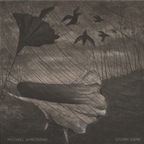 Poet Jake Marmer has a (deservedly) very positive review of a wonderful new album by Michael Winograd in this week's Forward:
Poet Jake Marmer has a (deservedly) very positive review of a wonderful new album by Michael Winograd in this week's Forward:
A Klezmerizing Performer: Clarinetist Winograd Transcends Tradition, by Jake Marmer (week of January 25, 2013)
"Thirty-year-old clarinetist and composer Michael Winograd is … [t]horoughly at home with traditional klezmer repertoire, he is able to powerfully summon the wild tragicomic essence of this music in his original compositions. His newest album, "Storm Game," is a complex and not easily classifiable record that not only showcases Winograd's impressive chops, but also grapples with fundamental questions about the very nature of contemporary American klezmer." [more]
August 23, 2012
Reb Shlomo meets Nigeria - Zion80
Here's a recent article by Alexander Gelfund in the Forward about the latest Jon Madof project, Zion80, which mashes up Shlomo Carlebach melodies with West African rhythms:
East Village Meets West Africa: Isrobeat Pioneers Zion80 Mash Up Shlomo Carlebach with Rhythms Inspired by Fela Kuti, by Alexander Gelfund, Aug 17, 2012
May 1, 2012
Reincarnation of a Niggun
From Talat's Alon Nechushtan, "Reincarnation of a Niggun," as performed by the Ayn Sof Orchestra, live from the six street synagogue in downtown New York, December 24th 2011.
Alon Nechushtan - "Reincarnation of a Niggun" for Big band from alon nechushtan on Vimeo.
March 30, 2011
Jeremiah Lockwood in Mali - the Tablet report
Sway Machinery frontman Jeremiah Lockwood returns from a festival in Mali and Tablet Magazine gets the skinny—photos, recordings, etc. Have fun!
February 14, 2011
Sway Machinery on NPR
This happened last week. There was a wonderful NPR story about a new release by Jeremiah Lockwood's The Sway Machinery (I have always considered the name to be a sly reference to both Hasidic-style nign and William Burrough's name for the human body, "The Soft Machine."). The interview covers a new release with Mali singer Khaira Arby:
The Brooklyn band the Sway Machinery formed five years ago around a particular notion: Take traditional Jewish music and make it funky enough for a nightclub. About a year ago, the Sway Machinery received an invitation to play for an audience its members probably never imagined at the Festival of the Desert in Timbuktu, Mali....
December 15, 2010
Jeremiah Lockwood, of The Sway Machinery sends this update:
I just recorded a track with Jordan McLean's DROID...extremely lovely experience...listen here:
www.forward.com/articles/133780"This is the last installation in my ten month long NIGUN PROJECT for the Forward...all ten collaborations (including work with Khaira Arby, Sahr Ngaujah, Brian Chase and other wonderful friends) based on old nigunim are now up online and can be heard here:"
www.forward.com/tags/the-nigun-project
You can also hear the first single from The House of Friendly Ghosts, Vol 1 on iTunes.
October 16, 2010
Greg Wall - "A Jam That Goes On Without End"
Really nice article (and accompanying video) that captures one of the current projects, the Ayn Sof Arkestra, of the amazing Greg Wall, rabbi and one of the most "really gets it" people creating Jewish music out there, from one of the NY Times "Local" blogs. His partner in founding Ayn Sof? One of the few other people who deserve that "really gets it" accolades, Frank London:
A Jam That Goes On Without End, by Clint Rainey, Oct 11, 2010
March 22, 2010
Jeremiah Lockwood - Forward's "Artist in Res" - Nigun Project
Jeremiah Lockwood, best known for his work in The Sway Machinery and Balkan Beat Box is this year's Artist in Residence at the Forward. In an article this week he describes, and provides a haunting recording, of his "Nigun Project," a fusion of African singing and nign.
The Nigun Project, by Jeremiah Lockwood, Mar 15, 2010
February 1, 2010
The Sway Machinery and Super 11 in Timbucktu
The Sway Machinery traveled to Mali in January to play at the Festival of the Desert. It was quite an exciting moment for the band. You can check out some of what transpired in this video of The Sway Machinery and Super 11:
September 7, 2009
Zahava Seewald video
Oh, this is delicious—from Alain Mihaly :
Extrait du concert Jacques Franck en juin 2008. Zahava Seewald et Zohara interprètent : la chanson "Abulafiah, I would Lay down my life" compositeur J. Zorn sur un thème de Samuel Hanagid Extrait du concert Jacques Franck en juin 2008. Zahava Seewald et Zohara interprètent : la chanson "Abulafiah, I would Lay down my life" compositeur J. Zorn sur un thème de Samuel Hanagid
May 30, 2009
Sway Machinery "EP of the month" project
Jeremiah Lockwood, of The Sway Machinery, sends this recent email. If you have caught the band live recently taking cantorial music to primal therapy places it may never have gone before, you'll know why this is such an appealing idea:
For years now I've holed up in a basement in Greenpoint that I rent from my friend Veronica. It's in this space that I write new material for The Sway Machinery, practice the band, do my research and development and generally hide away from the world and delve down into the gutter of my subconscious.
It's been a bit quiet with the band lately (although we will soon be starting up playing a bunch of exciting summer festivals). I've been thinking that I would like to invite the world down into my basement to hear the work I'm doing developing new sounds.
I am going to record an EP length CD of new music every month for six months--demos of new songs, solo blues performance, research into Classics of Chazzanus, experimentation of various stripes and colors. These EPs will be available to the public on a sunscription basis: for 50 bucks a subscriber will receive a limited edition EP-length CD with hand made cover in the mail every month for six months, June through December.
Drop me a line if you are interested in becoming a subscriber!
April 5, 2009
Interview with Greg Wall on the new Rav Kook project
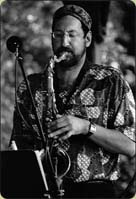 Israel's first chief rabbi's redemption poetry is turned into jazz performances by two rabbis on a new CD and in clubs. Rabbi Greg Wall of Hasidic New Wave fame and Rabbi Itzchak Marmorstein, son of Holocaust survivors release Ha'Orot—The Lights of Rav Kook on John Zorn's Tzadik Records and perform in clubs in Israel and New York. The full text interview with audio is available from Benjamin Bresky's radio show.
Israel's first chief rabbi's redemption poetry is turned into jazz performances by two rabbis on a new CD and in clubs. Rabbi Greg Wall of Hasidic New Wave fame and Rabbi Itzchak Marmorstein, son of Holocaust survivors release Ha'Orot—The Lights of Rav Kook on John Zorn's Tzadik Records and perform in clubs in Israel and New York. The full text interview with audio is available from Benjamin Bresky's radio show.
April 4, 2009
The Sway Machinery - interview in the Forward
I was forced to get my thoughts down about The Sway Machinery because I want to tell you about an excellent interview with band founder/leader Jeremiah Lockwood in this week's Forward. The web version has the longer interview and some mp3s:
Cantorial Blues: The Age of Myth Returns The Sway Machinery Frontman Jeremiah Lockwood on His Musical Development. By Hillel Broder. Published April 02, 2009.
January 18, 2009
Another view of John Zorn
Well, here's a take on John Zorn that sees him in a context that I would never have imagined. There is some interesting thinking happening, and I'm always pleased to promote good writing about someone as significant as Zorn. Check out new KlezmerShack author Carl Packman's John Zorn: The Paul of Klezmer Music
September 28, 2008
Jewlia Eisenberg's busy summer
I am so jealous. Eisenberg is one of the most creative people working with Jewish music (and just about everything) today. A query about a Ladino version of "Miserlu" (fielded by the always-knowledgeable Sephardic music maven Judith Cohen netted this wrapup of how she's spent her summer, none of it I might add with a bit if truculence, in Boston. (I did catch Basya Shaechter at Ashkenaz, so it was't a summer without creative highlights on this coast.) At least it's documented!:
… in other news, everything well here. played in the krakow jewfest this summer, that blew my mind. lots of amazing musicians, no sleep. here's a clip:
bowls project almost finished recording, it's coming out on tzadik in february. sketches here: www.charminghostess.us/projects.html
below on that page is this side project i'm doing on the intersection of rebetika and salonikan jewish folk music. kinda cool. doing it with the guys from kugelplex as you can see. it's pretty fun, sexy.
frank london was in town and we did a bunch of khassidish and roma tunes with him, it was fun, here's a little bit of one:
i think that's everything. …
September 26, 2008
Paul Brody's Sadawi in Lithuania
Here's a nice Rosh Hashana treat, as it were—interview with Paul Brody, with clips from a performance by his band "Sadawi," in Vilnius, Lithuania. Treat it as a counter to this summer's antisemitic incidents in that once-very-Jewish town.
And, of course, German-based trumpeter Paul Brody's bands are worth listening to regardless, or from wherever.
February 24, 2008
new reviews: Deep Minor, Polina Shepherd
 One of the themes of my recent reviewing concerns how much incredible music is coming from Eastern Europe. This week, as I double my output from last week, I have managed to tackle two of the most urgent CDs from my "review me now!" table. Alex Kontorovich was born in the former Soviet Union, but has grown up here in the States. While gathering a PhD in math in his spare time, he has also been one of the most exciting of the young musicians who have grown up since the revival. In Kontorovich's case, this means cooking up a delightful stew that melds klezmer with avant garde jazz in "born native" ways that older members of the Radical Jewish Music crowd can't do. His first solo CD, on Europe's "Chamsa" label is exciting, delightful, and features some of the other exciting leaders of this youthful surge. Check out Alex Kontorovich / Deep Minor and see what I mean.
One of the themes of my recent reviewing concerns how much incredible music is coming from Eastern Europe. This week, as I double my output from last week, I have managed to tackle two of the most urgent CDs from my "review me now!" table. Alex Kontorovich was born in the former Soviet Union, but has grown up here in the States. While gathering a PhD in math in his spare time, he has also been one of the most exciting of the young musicians who have grown up since the revival. In Kontorovich's case, this means cooking up a delightful stew that melds klezmer with avant garde jazz in "born native" ways that older members of the Radical Jewish Music crowd can't do. His first solo CD, on Europe's "Chamsa" label is exciting, delightful, and features some of the other exciting leaders of this youthful surge. Check out Alex Kontorovich / Deep Minor and see what I mean.
 In another mode, entirely, the most recent CD by the Polina Shepherd Vocal Experience manages to use traditional (and "traditional art song") forms to set a plethora of Yiddish poetry to music for the first time. The album is a celebration of vocal pyrotechnics, and a thorough-going pleasure, and demonstrates the originality of grounding of another artists born in the former Soviet Union (now residing in the UK). It is impossible not to love this CD, The Polina Shepherd Vocal Experience / Baym Taykh. As I wrote earlier in the Alex Kontorovich review, you can't have my copy so you'll just have to get your own. (Even my wife has her own copy, despite the fact that both of us share an itunes library!)
In another mode, entirely, the most recent CD by the Polina Shepherd Vocal Experience manages to use traditional (and "traditional art song") forms to set a plethora of Yiddish poetry to music for the first time. The album is a celebration of vocal pyrotechnics, and a thorough-going pleasure, and demonstrates the originality of grounding of another artists born in the former Soviet Union (now residing in the UK). It is impossible not to love this CD, The Polina Shepherd Vocal Experience / Baym Taykh. As I wrote earlier in the Alex Kontorovich review, you can't have my copy so you'll just have to get your own. (Even my wife has her own copy, despite the fact that both of us share an itunes library!)
New article on Rose/Fort/Winograd
 By rights I should ignore this rather good article in All About Jazz by Elliott Simon, our usual suspect. If I could stifle enough publicity, there would still be tickets at the box office when I roll in Monday week, hoping for a break in a long car trip from Baltimore. But that would be wrong. And the article, of course, is excellent. I long for the day when lesser-known, excellent avant garde music goes to Standing Room Only and beyond (I am avoiding the term "sell out" for obvious reasons). (John Zorn, given a small-enough venue in a major city, will always sell out. But everyone else?)
By rights I should ignore this rather good article in All About Jazz by Elliott Simon, our usual suspect. If I could stifle enough publicity, there would still be tickets at the box office when I roll in Monday week, hoping for a break in a long car trip from Baltimore. But that would be wrong. And the article, of course, is excellent. I long for the day when lesser-known, excellent avant garde music goes to Standing Room Only and beyond (I am avoiding the term "sell out" for obvious reasons). (John Zorn, given a small-enough venue in a major city, will always sell out. But everyone else?)
Find out what I'm talking about in this instance by reading Ayelet Rose, Anat Fort and Michael Winograd in Philadelphia, by Elliott Simon, posted 2/24/08.
February 14, 2008
David Krakauer live on the Internet Archive
The Internet Archive is the home to the "Wayback machine" and a host of other imperfectly-maintained archives. So, don't rely on the IA for the long-term preservation of your precious tapes. What you can rely on is that there are millions of digital recordings, from web pages to audio and video, available. Sadly, there is virtually no klezmer (and no much more Jewish music in general). The only thing I could find that was longer than a single clip was this performance/interview by David Krakauer (with SoCalled and the rest of the band circa "Bubbe Meises"). I'd say that this recording, alone, is worth exploring further for. Check it out at www.archive.org/details/KEXPKEXPLivePerformances_23
I, myself, have a very few live recordings of various bands created over the years. If you know that I have a recording of your band, and I haven't yet asked, please feel encouraged to email me and let me know that your recordings can be uploaded. It's a great option for me—I have no time to create podcasts, and don't record much because I never have time to listen to the recordings once I've made them. Even getting the recording from DAT or Digital Memory card takes time and energy that I often can't find. But, there should be good, interesting Jewish music that can be found online. I'm happy to help, and even more, I encourage others to participate here, or elsewhere.
June 16, 2007
Glenn Dickson performance online
Clarinetist Glenn Dickson, of Shirim Klezmer Orchestra and the more avantgarde Naftule's Dream writes:
My solo performance at the SOS Festival a couple of weeks ago is up on this very cool web site, Jamendo, which you should check out whether you want to hear me or not. My recording is at www.jamendo.com/en/album/5585/.
 You can download it for free, as well as any of the other music on the web site, it is all on a "Creative Commons" license which means you can download for personal use. Click on the "music" tab at the top and you can see a list of genres to start exploring, or click on the "spiral" tab to explore in a different way.
You can download it for free, as well as any of the other music on the web site, it is all on a "Creative Commons" license which means you can download for personal use. Click on the "music" tab at the top and you can see a list of genres to start exploring, or click on the "spiral" tab to explore in a different way.
March 3, 2007
John Zorn to receive William Schuman Award, NYC, Apr 26
Columbia University School of the Arts announces that
JOHN ZORN
is the 2007 recipient of the William Schuman Award
Columbia's MILLER THEATRE hosts concert and award ceremony
Thursday, April 26, 8:00PM
[Of special interest in this regard is John Zorn's recent reposting (posting?) of Radical Jewish Culture. ari]
Continue reading "John Zorn to receive William Schuman Award, NYC, Apr 26" »
January 22, 2007
Naftule's Dream in Forest Hills
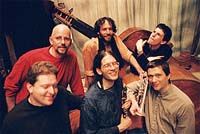 On a lovely spring day a couple of weeks ago, just after the goyishe New Year, I saw Naftule's Dream for the first time in ages. The setting was the Forsyth Chapel at Forest Hill's Cemetery here in Boston. The cemetery is one of at least a couple in Boston designed to provide a lovely place to picnic and to commune with the dead. In this case, although the band ended with "Black Wedding" from their very first CD, both the living and dead were very much at peace. Although, thinking of the intensity and wonderful disharmonics of some of the band's music, that might be a minor mis-statement.
On a lovely spring day a couple of weeks ago, just after the goyishe New Year, I saw Naftule's Dream for the first time in ages. The setting was the Forsyth Chapel at Forest Hill's Cemetery here in Boston. The cemetery is one of at least a couple in Boston designed to provide a lovely place to picnic and to commune with the dead. In this case, although the band ended with "Black Wedding" from their very first CD, both the living and dead were very much at peace. Although, thinking of the intensity and wonderful disharmonics of some of the band's music, that might be a minor mis-statement.
The band started off with some quieter new material, perhaps in keeping with the setting, but with the audience's approval and occasional nods to the klezmer music that gave them their name, the music got louder and more intense. The new pieces sound different—those showcased here were quieter and perhaps closer to chamber music in some ways that earlier, more prog-rock inflected numbers. Relatively new trumpeterGary Bohan was featured on at least one number, as were several by accordionist Michael McLaughlin.
As usual, I left at peace, with some of my inner chaos expressed, and ready to see them again, soon. The only thing that could have made the event closer to perfect would have been the Isaac Bashevis Singer material that they worked up years ago and never recorded. Yiddish ghost stories for a New England cemetery—that would be pretty slick.
November 27, 2006
CD Review: Andy Statman / East Flatbush Blues
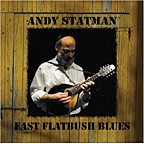 Andy Statman / East Flatbush Blues. Shefa Records, HORN-3001, 2006 www.andystatman.org .
Andy Statman / East Flatbush Blues. Shefa Records, HORN-3001, 2006 www.andystatman.org .
CD available from amazon.com. Elliott Simon has also reviewed this CD for All About Jazz.
The Klezmershack received two new CDs by Andy Statman, recorded contemporaneously, each featuring a different side of the artist. This is the bluegrass CD, and on it Statman is backed by Jim Whitney, and one of my favorite Americana drummers, Larry Eagle. Eagle I last heard propelling Bruce Springstein's "Pete Seeger Sessions" show. Statman I last saw playing with one of my favorite bluegrass bands, Wayfaring Strangers. But standing there, Statman merged bluegrass with klezmer and hassidic music. On this CD, he pays tribute to Bill Monroe and to his bluegrass roots only. I gotta say: when you're Andy Statman, that's enough.
Continue reading "CD Review: Andy Statman / East Flatbush Blues" »
CD Review: Marilyn Lerner / Romanian Fantasy
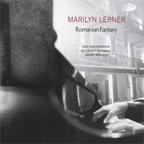 Marilyn Lerner / Romanian Fantasy. ML-001, 2006 www.marilynlerner.com JD003, 2005.
Marilyn Lerner / Romanian Fantasy. ML-001, 2006 www.marilynlerner.com JD003, 2005.
CD available from CD Baby.com
I am at the point that if Marilyn Lerner breathes on a piano, I am already giddy. Here, on the first solo outing in a few years based on traditional Eastern European Jewish music, I am doubly ecstatic. Her improvisational playing is as inventive as ever. From the explorations and chording the forms the bones of the "Yismekhu", there is something magical about her sense of sound and tone and music. As Michael Wex notes in the liner notes, this isn't klezmer, or Eastern European Jewish folk music, nor classical nor jazz. It's the Jewish music about which I once wrote, "I can see the Shekhinah sitting up in the heavens, listening to this music performed, smiling to herself and saying to the assembled angels, 'Finally, we can listen to it in its true time and place.'"
Continue reading "CD Review: Marilyn Lerner / Romanian Fantasy" »
June 4, 2006
New reviews on the KlezmerShack start with Israel music
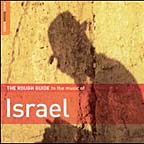 It started with a new Rough Guide release, this time, the Rough Guide to the music of Israel. It is really good. I don't mention it very often, but I first began writing about Jewish music as a reviewer for the Jerusalem Post back in the late 1970s. By then I had spent years doing community theatre and hanging out with musicians in Israel. I didn't write for the Post long—it was difficult to focus on a gig writing for a newspaper that I shunned reading—but I have never lost my love for Israeli music and its diversity. This recording captures a good slice of that diversity, as updated and compiled just a couple of months ago. There is also an interview with the compiler on the CD, playable on a computer via webbrowser. Although a Jewish lad growing up in a Zionist home, the compiler seems ignorant of most details of modern Jewish history. But he has enough generalities generally right that this, too, forms a good introduction to Israeli music, overall. Those who let their ears get them into trouble will dig more deeply.
It started with a new Rough Guide release, this time, the Rough Guide to the music of Israel. It is really good. I don't mention it very often, but I first began writing about Jewish music as a reviewer for the Jerusalem Post back in the late 1970s. By then I had spent years doing community theatre and hanging out with musicians in Israel. I didn't write for the Post long—it was difficult to focus on a gig writing for a newspaper that I shunned reading—but I have never lost my love for Israeli music and its diversity. This recording captures a good slice of that diversity, as updated and compiled just a couple of months ago. There is also an interview with the compiler on the CD, playable on a computer via webbrowser. Although a Jewish lad growing up in a Zionist home, the compiler seems ignorant of most details of modern Jewish history. But he has enough generalities generally right that this, too, forms a good introduction to Israeli music, overall. Those who let their ears get them into trouble will dig more deeply.
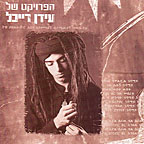 The problem was that I got so wrapped up in the first CD, that I had to spend time with that Idan Raichel CD that I've been meaning to write about for years: 2002's Idan Raichel Project. I find this the most mind-blowing Israeli CD in years. In some ways, it reminds of of Ofra Haza's early work, an explosion of traditional sounds transformed for this time and place. It also reminds me of my favorite Israeli band of the '90s, the Ethnix. But it's also it's own original sound, building on Israeli and world music, with everything from reggae to hip hop, inflected by Raichel's Ethiopian roots. Wonderful.
The problem was that I got so wrapped up in the first CD, that I had to spend time with that Idan Raichel CD that I've been meaning to write about for years: 2002's Idan Raichel Project. I find this the most mind-blowing Israeli CD in years. In some ways, it reminds of of Ofra Haza's early work, an explosion of traditional sounds transformed for this time and place. It also reminds me of my favorite Israeli band of the '90s, the Ethnix. But it's also it's own original sound, building on Israeli and world music, with everything from reggae to hip hop, inflected by Raichel's Ethiopian roots. Wonderful.
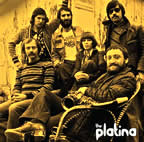 By now I was in trouble, so I also polished off a review of the relatively recent release of the final album by Israeli jazz masters, The Platina: Platina / Girl with the Flaxen Hair. Released back in 2003 as part of tributes to bandleader Roman Kunsman who had just passed away, this is material that was original recording in 1976 and then lost. The studio mangled most of the original tapes, then the band broke up. And we all moved on, remembering the concerts and the transformed Debussey of the title track. I have tried to begin to describe how good it sounds, even now, 30 years later. This is a must-have CD for anyone remotely interested in jazz or jazz-rock or Debussey.
By now I was in trouble, so I also polished off a review of the relatively recent release of the final album by Israeli jazz masters, The Platina: Platina / Girl with the Flaxen Hair. Released back in 2003 as part of tributes to bandleader Roman Kunsman who had just passed away, this is material that was original recording in 1976 and then lost. The studio mangled most of the original tapes, then the band broke up. And we all moved on, remembering the concerts and the transformed Debussey of the title track. I have tried to begin to describe how good it sounds, even now, 30 years later. This is a must-have CD for anyone remotely interested in jazz or jazz-rock or Debussey.
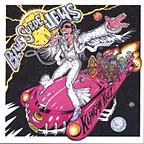 There is something about Philadelphia Jews. I've said this before, but with the release of Klingon Klezmer / Blue Suede Jews, it bears repeating. This is, after all, the home of Benny and the Vilda Chayas. But it's also Hankus Netsky's home turf. It's the city that gave us not only Anthony Coleman, but also nth generation straight-ahead klezmorim like Rachel Lemish and Susan Watts. This latest excursion by the Klingons is a delightful, zany, and damn fine exploriation of the psychedelic side of klezmer.
There is something about Philadelphia Jews. I've said this before, but with the release of Klingon Klezmer / Blue Suede Jews, it bears repeating. This is, after all, the home of Benny and the Vilda Chayas. But it's also Hankus Netsky's home turf. It's the city that gave us not only Anthony Coleman, but also nth generation straight-ahead klezmorim like Rachel Lemish and Susan Watts. This latest excursion by the Klingons is a delightful, zany, and damn fine exploriation of the psychedelic side of klezmer.
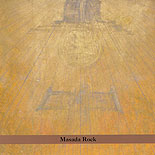 The 10th Anniversary of the first Masada material has prompted a wonderful re-examination of that work by a wide variety of artists. I confess to being among the few who find Zorn's Masada okay, but don't have a great need to own each volume. On the other hand, listening to Jon Madof and his noisemakers, er, Rashanim, transform some of the material is entirely different. 2005's Rashanim / Masada Rock, Vol. 5 is going to be part of your essential Masada collection.
The 10th Anniversary of the first Masada material has prompted a wonderful re-examination of that work by a wide variety of artists. I confess to being among the few who find Zorn's Masada okay, but don't have a great need to own each volume. On the other hand, listening to Jon Madof and his noisemakers, er, Rashanim, transform some of the material is entirely different. 2005's Rashanim / Masada Rock, Vol. 5 is going to be part of your essential Masada collection.
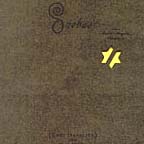 Ladies and gentlemen, for another take on the extraordinary John Zorn/Masada material, may I offer you the totally flipped, amazing Koby Israelite / Orobas: Book of Angels Vol. 4, 2006.
Ladies and gentlemen, for another take on the extraordinary John Zorn/Masada material, may I offer you the totally flipped, amazing Koby Israelite / Orobas: Book of Angels Vol. 4, 2006.
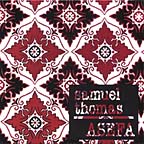 And, finally, in a nod to everything that I didn't have time to listen to today, all of which is at least htis good, I offer one last fusion, the world music band Asefa, house band to Sam Thomas' Brooklyn-based "Jewish Awareness through Music" organization. Samuel Thomas / Asefa, 2005. Same bass-player, incidentally, as with Jon Madof's Rashanim. These folks get around!
And, finally, in a nod to everything that I didn't have time to listen to today, all of which is at least htis good, I offer one last fusion, the world music band Asefa, house band to Sam Thomas' Brooklyn-based "Jewish Awareness through Music" organization. Samuel Thomas / Asefa, 2005. Same bass-player, incidentally, as with Jon Madof's Rashanim. These folks get around!
I can't believe how many CDs are crying out for attention and didn't get any today. Stay tuned. I'll try to do this again, real soon now. I have to. The pile fell over last week. Everything is confused, and until I get some reviews written and some CDs put away, I've lost use of my favorite reading chair.
April 8, 2006
Sway Machinery on NPR
I listened hard to the first Sway Machinery album when it first came out. It wasn't klezmer. It wasn't punk or blues. It was't clear to me that it represented something that I needed to hear often.
Lately, I've been hearing more buzz about the band. In this interview for the NPR show, Benjamin Walker's "Theory of Everything," band leader Jeremiah Lockwood talks about chazanes and his grandfather, Jacob Koenigsberg, a wonderful chazan from the Golden Age. He also talks about the cantor as a spokesperson—he doesn't use the word, but he seems to be referring to the cantor as shaliakh tsibur (have I got the term right)—and also refers to the cantor as a storyteller.
So, now you have a guy playing a very emotional, noisy, blues-based music with stretches of chazones of some form—something his fellow band member, Stuart Bogie says could just as easily be speaking in tongues. I still don't know that I like it, or hear the divine in it, but it's definitely worth checking out.>In the end, I don't have to decide. I just have to keep on listening. So do you!:
www.toeradio.org/archives/2006/04/toe_040806_sway.html
You can check the band out live, on April 9th, in Brooklyn
February 27, 2006
Sway Machinery Live: Jack from Mimaamakim
Over at the blog version of 'Mimaamakim," blogger Jake has recorded a wonderful review of the Sway Machinery live this weekend. Wish I could have been there!
December 31, 2005
George Robinson: Best Jewish Music Recordings of 2005
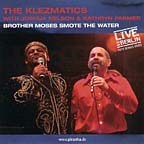 George Robinson writes frequently for the Jewish Week. He listens to an incredible diversity of music. Take a read of Five Stars All Around:
From chasidic reggae to Golden Age chazanut, the best recordings of 2005, Jewish Week, 12/30/2005 (could this really be? Posting a new review in a timely fashion! I'll try to keep up for a while! Since several of the CDs I've been meaning to review are on this list, I even resolve to catch up here at home!)
George Robinson writes frequently for the Jewish Week. He listens to an incredible diversity of music. Take a read of Five Stars All Around:
From chasidic reggae to Golden Age chazanut, the best recordings of 2005, Jewish Week, 12/30/2005 (could this really be? Posting a new review in a timely fashion! I'll try to keep up for a while! Since several of the CDs I've been meaning to review are on this list, I even resolve to catch up here at home!)
November 13, 2005
NPR Interview: John Zorn and John Madof
 Hey, if this isn't a good excuse to be up early and listening to NPR instead of working! A really nice interview with John Zorn about his Masada music, and John Madof who recently released one of the 10th Anniversary Masada albums, and of John Madof. What I found especially interesting was the assertion that the Radical Jewish Music label was formed to give a voice to Jewish music that is broader than klezmer—to counter the notion that klezmer and Jewish music are synonyms—a goal with which anyone who knows and loves Jewish music (see last week's entry on "A Cantor's Tale," for one non-klezmer roots example) will heartily concur.
Hey, if this isn't a good excuse to be up early and listening to NPR instead of working! A really nice interview with John Zorn about his Masada music, and John Madof who recently released one of the 10th Anniversary Masada albums, and of John Madof. What I found especially interesting was the assertion that the Radical Jewish Music label was formed to give a voice to Jewish music that is broader than klezmer—to counter the notion that klezmer and Jewish music are synonyms—a goal with which anyone who knows and loves Jewish music (see last week's entry on "A Cantor's Tale," for one non-klezmer roots example) will heartily concur.
It's an interesting interview with excellent song samples. The audio should be available for rerun online today after 1pm EST at 'Masada Songbook': Zorn Redefines Jewish Music
link updated 3/21/07
February 2, 2004
New KlezmerShack reviews
Four new reviews on the KlezmerShack:
 Freylach Time!, based in the Research Triangle area of North Carolina is a tradtional klezmer gem. It is also a community treasure. Now that the band has finally recorded, you can hear for yourself: Freylach Time! / The Klezmer Dance Band
Freylach Time!, based in the Research Triangle area of North Carolina is a tradtional klezmer gem. It is also a community treasure. Now that the band has finally recorded, you can hear for yourself: Freylach Time! / The Klezmer Dance Band
 London's Oi Va Voi has been impressing audiences from the UK to KlezKamp and everywhere in between for years. Whatever they are playing, it isn't klezmer any more, except insofar as it gets people up to dance. This new album, "Laughter Through Tears" just made the New York Time's "10 Best" list for 2003. For a change, I agree!: Oi Va Voi / Laughter Through Tears
London's Oi Va Voi has been impressing audiences from the UK to KlezKamp and everywhere in between for years. Whatever they are playing, it isn't klezmer any more, except insofar as it gets people up to dance. This new album, "Laughter Through Tears" just made the New York Time's "10 Best" list for 2003. For a change, I agree!: Oi Va Voi / Laughter Through Tears
 César Lerner and Marcelo Moguilevsky are two amazing musicians from Argentina. I've seen them perform in the UK and Canada. Now you can year why audiences love them and their brand of passionate klezmer infused with South American jazz. The new album, Sobreviviente, is live: Lerner Moguilevsky Duo / Sobreviviente
César Lerner and Marcelo Moguilevsky are two amazing musicians from Argentina. I've seen them perform in the UK and Canada. Now you can year why audiences love them and their brand of passionate klezmer infused with South American jazz. The new album, Sobreviviente, is live: Lerner Moguilevsky Duo / Sobreviviente
 A year with a new release from the Klezmer Conservatory Band is a good year. This latest contains many new gems - more than a taste of paradise: Klezmer Conservatory Band / A Taste of Paradise
A year with a new release from the Klezmer Conservatory Band is a good year. This latest contains many new gems - more than a taste of paradise: Klezmer Conservatory Band / A Taste of Paradise
January 8, 2004
Krakauer "Live in Krakow"
 David Krakauer has released a live album, recorded last summer in his family's ancentral town, Krakow. The album, on France's notable jazz label, "Label Bleu", is due to be released in the US by Harmonia Mundi USA on January 13th.
David Krakauer has released a live album, recorded last summer in his family's ancentral town, Krakow. The album, on France's notable jazz label, "Label Bleu", is due to be released in the US by Harmonia Mundi USA on January 13th.
Krakauer's "Klezmer Madness" ensemble will be making its Carnegie Hall debut on February 25th with guest artist jazz composer/pianist Uri Caine.
November 23, 2003
New KlezmerShack reviews
There never seems to be time to review everything I'd like to write about. When music this good arises, I find myself listening over and over and forgetting to move on. That's okay. That's why I listen and write in the first place. So, from Australia to Ireland via California and Salonika via NYC, here are the latest. If you are getting an early start on your Chanuka shopping this coming weekend, pay good attention - these are the new musics that folks will be wanting:
 The Fig Tree, 2003
The Fig Tree, 2003
This is a delightful collection of Greek, Jewish, and other music, accompanying a book on immigrants to Australia by Arnold Zable. Don't let the distance from Australia stop you from listening to this, hearing the latest from our favorite Australian klezmer bands, and hearing some wonderful other music, as well.
 CeiliZemer / Shalom Ireland, 2003
CeiliZemer / Shalom Ireland, 2003
Continuing the international tour, this soundtrack to a documentary about Jews in Ireland fuses the two musics delightfully. Yes, indeed, think of what hasidic music (and klezmer) might have been like if the uillean pipes had been available in Eastern Europe. There's still time to add them here.
 David Chevan / Days of Awe, 2003
David Chevan / Days of Awe, 2003
Chevan has gathered his Afro-Semitic Experience, including guitar wizzard Stacy Phillips, and added Frank London. The result is exquisite jazz versions of music from the High Holy Days. If you like this sort of thing (I do), this is definitely the sort of thing that you will like.
 Margot Leverett & the Klezmer Mountain Boys, 2003
Margot Leverett & the Klezmer Mountain Boys, 2003
Today's theme seems to be fusion music. You got yer Greeks and Klezmers; you got yer Irish and Klezmers. And when you're especially lucky, you got your bluegrass klezmers. But, it's a Margot Leverett album, so you already knew that it would be on your "essential klezmer" list, anyway. I think of Leverett the way I think of Jeff Warschauer and Deborah Strauss - if she's involved, it's not only amazing, but it's comfort music - the perfect accompaniment for when you feel great, and an even better accompaniment for when you need a lift.
 Sarah Aroeste / A la una, 2003
Sarah Aroeste / A la una, 2003Mobius, of my favorite Jewish weblog, Jew*School suggested that I write something about these new Sephardic artists. Some I knew. Aroeste's name was unfamiliar. It shouldn't be. This is extraordinary Ladino music, set with contemporary instrumentation and sounds by someone who has worked with good avant garde musicians and knows what good music should sound like. But the critical part is how seamlessly she has kept the feel of traditional Ladino song. This is one of our favorite albums this year. Who knew?
 Solomon & Socalled / HipHopKhasene, 2003
Solomon & Socalled / HipHopKhasene, 2003
As much fun as I had writing about everything else, this is my favorite of the bunch. Witty, brilliant, funny, and great music. The album features not only the amazing Socalled, but Oi Va Voi's Sophie Solomon. Guests include David Krakauer, Zev Feldman, Frank London, Michael Alpert, Elaine Hoffman-Watts and daughter Susan... even Jewish-music mailing list regular, Cantor Sam Weiss. Essential for all but the humor-impaired.
November 3, 2003
New reviews by George Robinson
George Robinson announces a slew of new music columns published almost all together in New York's Jewish Week:
Five-Star Klez: From New Orleans and Odessa, fusion and traditional approaches.
A Fall Sampler: From Solomon Rossi to Michael Strassfeld.
Heard Around The World: From Turkey to London to the Lower East Side.
October 20, 2003
Review: Kruzenshtern & Parohod / the craft of primitive klezmer
 They are a trio and they don't play klezmer. But whatever it is, this is wonderful, wonderful experimental music - the sort of music that causes people like me to brave dozens of tedious mishmoshes of sound to find something this good.
They are a trio and they don't play klezmer. But whatever it is, this is wonderful, wonderful experimental music - the sort of music that causes people like me to brave dozens of tedious mishmoshes of sound to find something this good.
All I know about the band is that they come from Russia. Now they live in Israel. They formed a year ago. And they are insanely good. For more, read my review. Then run out and order the album.
August 13, 2003
Latest reviews on the KlezmerShack
Sometimes I get so caught up into listening to new music that I forget to tell people about reviews written. That is particular unfortunate this week, since there are some really exciting albums that I wrote about:
 Into the Freylakh has produced a debut album that includes a very tuneful mix of klezmer and jazz. Lots of new jazz material, in particular, to gladden your ears. The album cover is also quite classy.
Into the Freylakh has produced a debut album that includes a very tuneful mix of klezmer and jazz. Lots of new jazz material, in particular, to gladden your ears. The album cover is also quite classy.
 Fialke / A grus fun der alter heym. Now, someone explain to me why some of the best traditional klezmer is coming from Germany? For those of us waiting on a next fix from Budowitz or Khevrisa, Fialke steps into the breach. Guest participation by Budowitz tsimbl-master Josh Horowitz helps, too. (Horowitz is currently finishing up an album with fellow-tsimbler Stu Brotman of Brave Old World, et al, and Cookie Segelstein of Klezical Tradition, himself, so stay tuned.)
Fialke / A grus fun der alter heym. Now, someone explain to me why some of the best traditional klezmer is coming from Germany? For those of us waiting on a next fix from Budowitz or Khevrisa, Fialke steps into the breach. Guest participation by Budowitz tsimbl-master Josh Horowitz helps, too. (Horowitz is currently finishing up an album with fellow-tsimbler Stu Brotman of Brave Old World, et al, and Cookie Segelstein of Klezical Tradition, himself, so stay tuned.)
 Paul Brody's Sadawi / Kabbalah Dream. This is one of the most amazing trumpet albums I have heard in a while. Klezmer, jazz, avant-garde, and entirely listenable.
Paul Brody's Sadawi / Kabbalah Dream. This is one of the most amazing trumpet albums I have heard in a while. Klezmer, jazz, avant-garde, and entirely listenable.
Enjoy!
August 4, 2003
Five new music reviews
I only got to two of the brand new recordings this weekend, partly because I've had trouble putting away some of the CDs that were sent last year. It's time. It's certainly time to spread the word.
 Anyone who has watched him perform, or more broadly, who has seen Claudia Heuermann's "Sabbath in Paradise," which covers the New York downtown Jewish music scene, is familiar with Coleman's work. His recordings with Sephardic Tinge--Coleman accompanied by bass and drums--present him at his most accessible and, I think, most lyrical. Last year's Our Beautiful Garden Is Open is an excellent example.
Anyone who has watched him perform, or more broadly, who has seen Claudia Heuermann's "Sabbath in Paradise," which covers the New York downtown Jewish music scene, is familiar with Coleman's work. His recordings with Sephardic Tinge--Coleman accompanied by bass and drums--present him at his most accessible and, I think, most lyrical. Last year's Our Beautiful Garden Is Open is an excellent example.
 I remember being amused by the name, "Orient Express Shnorer Klezmers" or something--a French klezmer band that seemed interesting, but I never had time to write a review. Now they have evolved into an incredibly articulate, brassy klezmer jazz ensemble. This tribute to Jewish food is a perfect introduction. Remember, when terrorists put a bomb in Paris back in the mid-eighties, it was a Jewish deli that was bombed. This is French Jewish food. Food matters. Delicatessen
I remember being amused by the name, "Orient Express Shnorer Klezmers" or something--a French klezmer band that seemed interesting, but I never had time to write a review. Now they have evolved into an incredibly articulate, brassy klezmer jazz ensemble. This tribute to Jewish food is a perfect introduction. Remember, when terrorists put a bomb in Paris back in the mid-eighties, it was a Jewish deli that was bombed. This is French Jewish food. Food matters. Delicatessen
 This is simply a pleasure. One of the most beautiful Sephardic albums I have heard in a while. Lovingly documented, beautifully sung by Hadass Pal-Yarden. Yahudice
This is simply a pleasure. One of the most beautiful Sephardic albums I have heard in a while. Lovingly documented, beautifully sung by Hadass Pal-Yarden. Yahudice
 Yes, we have another name change. The band whose name was once preceded by "Shawn's", is now simply "Kugel." Be that as it may, here's another helping of everything from the Grateful Dead to Aleynu, in Finger Play
Yes, we have another name change. The band whose name was once preceded by "Shawn's", is now simply "Kugel." Be that as it may, here's another helping of everything from the Grateful Dead to Aleynu, in Finger Play
 This week's winner of the "another band that I would have happily hired for my own wedding" is KlezmerFest. The band includes a couple of members of Hasidic New Wave, but this is where they get down and make traditional Party Music.
This week's winner of the "another band that I would have happily hired for my own wedding" is KlezmerFest. The band includes a couple of members of Hasidic New Wave, but this is where they get down and make traditional Party Music.
July 27, 2003
Four new reviews
Despite best of intentions, I couldn't stop listening to these four albums this weekend. So that's as many reviews as got done:
 I used to claim that the New Orleans Klezmer Allstars were the hardest working klezmer bar band in existence. They've gotten much better than that. And their mix of New Orleans funk and Jewish soul just gets better and better with Borvis.
I used to claim that the New Orleans Klezmer Allstars were the hardest working klezmer bar band in existence. They've gotten much better than that. And their mix of New Orleans funk and Jewish soul just gets better and better with Borvis.
 This is almost the Jewish equivalent of Gregorian Chant, just more recent, in tune with the music of the Ottoman Empire, and, well, very Jewish. Very well done, with very good notes: Maftirim.
This is almost the Jewish equivalent of Gregorian Chant, just more recent, in tune with the music of the Ottoman Empire, and, well, very Jewish. Very well done, with very good notes: Maftirim.
 If, like me, you thought that Adrianne Greenbaum's flute album, or the Duo Controverso albums were high points of the year, then this incredible collection of clarinet-accordion pieces based on perfect klezmer will be the next essential stop. Truly heymisher.
If, like me, you thought that Adrianne Greenbaum's flute album, or the Duo Controverso albums were high points of the year, then this incredible collection of clarinet-accordion pieces based on perfect klezmer will be the next essential stop. Truly heymisher.
 This is the best Klezmatics album since, oh, "Jews with Horns"? Ecstatic music, ranging from klezmer to hasidish to the edges of new Yiddish music, and words worth listening to, context worth considering. If you read the KlezmerShack, you've probably already got your copy. If not, time to Rise Up.
This is the best Klezmatics album since, oh, "Jews with Horns"? Ecstatic music, ranging from klezmer to hasidish to the edges of new Yiddish music, and words worth listening to, context worth considering. If you read the KlezmerShack, you've probably already got your copy. If not, time to Rise Up.
June 14, 2003
Review of Paul Shapiro album
 Elliott Simon spotted this one - a review of Paul Shapiro's Midnight
Minyan by Celeste Sunderland, from All About Jazz-New York June 2003.
Elliott Simon spotted this one - a review of Paul Shapiro's Midnight
Minyan by Celeste Sunderland, from All About Jazz-New York June 2003.
I raved about the same album, myself, not to long ago.
June 11, 2003
Elliott Simon reviews in "Squids Ear"
Elliott Simon writes to the Jewish-Music mailing list:
 "Hi...just wanted to make those interested aware of a website that
caters to NYC experimental/improvisational music and as such does
feature/promote a fair amount of Jewish influenced jazz CDs/concerts.
It is run by Kurt Gottschalk who I met at the recent NYC visions
festival. At which, BTW, Erik Friedlander, Greg Cohen and Mark Friedman
performed an incredible set as the Masada String Trio. They were
conducted by John Zorn who sat on stage in front of the trio. Anyway,
Kurt asked me to review the new Koby Israelite CD (which has generated
some discussion in here already)...so check out the site
www.squidsear.com
"Hi...just wanted to make those interested aware of a website that
caters to NYC experimental/improvisational music and as such does
feature/promote a fair amount of Jewish influenced jazz CDs/concerts.
It is run by Kurt Gottschalk who I met at the recent NYC visions
festival. At which, BTW, Erik Friedlander, Greg Cohen and Mark Friedman
performed an incredible set as the Masada String Trio. They were
conducted by John Zorn who sat on stage in front of the trio. Anyway,
Kurt asked me to review the new Koby Israelite CD (which has generated
some discussion in here already)...so check out the site
www.squidsear.com
Simon's first review for Squids Ear is of the nearly-ubiquitous Koby Isaelite "Dance of the Idiots" (which I reviewed last week, and Richard Sharma reviewed a few weeks earlier)
In addition, he suggests checking out Eyal Hareuveni's review of Borah Bergman: Piano Meditations
June 8, 2003
Lots of new reviews of almost everything
 I got carried away. CDs were falling off the shelf, so I sat down this weekend and stayed sat down until I got several reviewed. We've got some great new Jewish music, some avant garde and jazz, some klezmer (lots of klezmer), some Sephardic and Mizrahi music, more klezmer and Yiddish folk.... That's not the whole gamut, but odds are that something in this weekend's stack will be just what you were looking for:
I got carried away. CDs were falling off the shelf, so I sat down this weekend and stayed sat down until I got several reviewed. We've got some great new Jewish music, some avant garde and jazz, some klezmer (lots of klezmer), some Sephardic and Mizrahi music, more klezmer and Yiddish folk.... That's not the whole gamut, but odds are that something in this weekend's stack will be just what you were looking for:
- Aufwind / Inejnem, 2002, Yiddish folk/theatre/klezmer
- Gilad Atzmon & Orient House Ensemble / Exile, 2003, jazz w/Middle Eastern influences, political
- Koby Israelite / Dance of the Idiots, 2003, cholent--just about everything
- Metropolitan Klezmer / Surprising Finds, 2003, klezmer, yiddish folk, theatre, more
 Den Flygande Bokrullen / Tarrschwein, 2002, headbanger klezmer
Den Flygande Bokrullen / Tarrschwein, 2002, headbanger klezmer- Flying Bulgar Klezmer Band / Sweet Return, 2003, klezmer, yiddish, new Jewish music
- Divahn, 2002, Sephardic, Mizrahi
- Massel-Tov / Vas iz vikhtik..., 2002, klezmer, Yiddish

June 5, 2003
Margot Leverett in special Tonic show, Sun Jun 8
 The amazing Margot Leverett is at the Tonic this Sunday. This is a short notice show to fill in. It would be a major bummer for the audience to be limited to the two folks who happened to wander by due to late publicity. Here's the scoop:
The amazing Margot Leverett is at the Tonic this Sunday. This is a short notice show to fill in. It would be a major bummer for the audience to be limited to the two folks who happened to wander by due to late publicity. Here's the scoop:
Margot Leverett and Ruslan Agababayev present a very special program of klezmer and jazz improvisation. Ruslan is a young prodigy with a startlingly original take on klezmer and jazz. This will be an unforgettable afternoon!
Tonic is at 107 Norfolk St in Manhattan (F train to Delancey), or take Williamsburg bridge to Delancey and turn right on Norfolk. Shows are at 1:30 and 3pm, $10 for one show, $15 for both. Brunch available and optional. (212) 358-7501
See you there!
And don't forget Seth Rogovoy's recent interview with her at www.rogovoy.com/447.shtml
May 6, 2003
Review of Koby Israelite
 Self-proclaimed "Renaissance Man," Richard A. Sharma raves about the latest Tzadik release by Koby Israelite. Tzadik Records describes the new release as a combination of "Cantorial Death Metal, Nino Rota Klezmer, Balkan Surf, Catskills free improvisation". It's gotten my attention, and I'm looking forward to listening to it, myself. You can head straight for the review (okay, I would format the pages differently, which would make them differently hard-to-read) at www.rainlore.demon.co.uk/Reviews/KobyIsraelite-DanceOfTheIdiots.html
Self-proclaimed "Renaissance Man," Richard A. Sharma raves about the latest Tzadik release by Koby Israelite. Tzadik Records describes the new release as a combination of "Cantorial Death Metal, Nino Rota Klezmer, Balkan Surf, Catskills free improvisation". It's gotten my attention, and I'm looking forward to listening to it, myself. You can head straight for the review (okay, I would format the pages differently, which would make them differently hard-to-read) at www.rainlore.demon.co.uk/Reviews/KobyIsraelite-DanceOfTheIdiots.html
RAS has accumulated an impressive set of reviews, as well as uploaded archives on early Jewish European music star, Guzikov. Knock at Rainlore's World of Music, at www.rainlore.demon.co.uk/WorldOfMusic.html
May 4, 2003
Three new reviews
As I try to catch up, I am happily snowed under by even more incredible music. Here is a taste:

Italy's Klezroym have put together an incredibly powerful album, "Yankele nel Ghetto," based on Gila Flam's collection of songs from the Lodz Ghetto. Notes in Italian and English.
 Rob Burger's recent Tzadik release, "Lost Photograph," combines lounge and exotica with South American and Jewish styles.
Rob Burger's recent Tzadik release, "Lost Photograph," combines lounge and exotica with South American and Jewish styles.
Wholesale Klezmer's new "Sing for Peace, Dance for Joy" shows why I think of the band as "Comfort Klezmer".
April 27, 2003
New Flying Bulgars; Album Release May 10,11

There are a very few new Jewish music bands: Brave Old World, say, or the Klezmatics, who consistently push the envelope and take my breath away like the Flying Bulgars. I have arranged work schedules so that I can stop off in Toronto to see them perform. It is therefore with great excitement that I present the following:
The Flying Bulgar Klezmer Band
presents a CD Release Celebration Concert for their new recording,
Sweet Return
Saturday, May 10, 8:30pm; Sunday, May 11, 2pm
Hugh's Room, 2261 Dundas St W, Toronto
Tickets: Sat. $15/Sun. $12 BOX OFFICE: 416-531-6604
Continue reading "New Flying Bulgars; Album Release May 10,11" »
April 11, 2003
TRANCE: An Art Installation (Opens April 30)
ELDRIDGE STREET PROJECT
presents a site-specific multimedia installation
TRANCE
Pearl Gluck and Basya Schechter
April 30 - July 30 2003
OPENING NIGHT WED, APRIL 30, 6PM
live performance and reception

12 Eldridge Street, (between Canal and Division)
FOR FURTHER INFORMATION 212.978.0803
Continue reading "TRANCE: An Art Installation (Opens April 30)" »
March 23, 2003
New KlezmerShack Reviews
 It's been a very fun week. There are new reviews up demonstrating, once again, the absurd bread of interesting music that is being sent to the KlezmerShack:
It's been a very fun week. There are new reviews up demonstrating, once again, the absurd bread of interesting music that is being sent to the KlezmerShack:
Naftule's Dream / Live in Florence is a dream--this live recording catches the energy and interplay of this post-klezmer edge band as nothing yet.
 Dresder & Mayer / Sruli and Lisa's Klezmer Dance Party provides the answer to the question: "what two people are most responsible for people associating "party" and "klezmer".
Dresder & Mayer / Sruli and Lisa's Klezmer Dance Party provides the answer to the question: "what two people are most responsible for people associating "party" and "klezmer".
Nikolayev Kapeliah / Vodkazak features some of my favorite klezmer and jazz musicians (Alicia Svigals, Jeff Warschauer, Sy Kushner, Marty Confurious, Nicki Parrot) tearing up chasidic standards. Hot.
Meshugga Beach Party. It's time to twist to those freilachs once again. Dick Dale meets "Hatikvah" and wins.
March 15, 2003
Review of Klezthetics CD, "Calistrophy" by Elliott Simon
My review of Burton Greene's Klezthetics.....Calistrophy is now posted online....
The latest offering from pianist Burton Greene, Calistrophy, is a curious blend of klezmer, blues, swing, free form, Latin, Balkan and plain old straight ahead jazz. Greene, a founding member of the '60s cutting edge Free Form Improvisation Ensemble, was, with his group Klezmokum, also among the first to reacquaint contemporary jazz with klezmer. Joining Greene on this effort, and billed as the Klez-Thetics, are Hungarian reeds player Akos Laki and Klezmokum's core rhythm-masters drummer Roberto Haliffi and tubaist Larry Fishkind.....
February 23, 2003
Five New Reviews
 In what I hope will be the beginning of a plethora of new reviews, as I catch up with the pile of CDs that has accumulated since before my wedding, I have the first five up. All of these are great albums, but I caution folks that this is still the tip of the iceberg. In any event:
In what I hope will be the beginning of a plethora of new reviews, as I catch up with the pile of CDs that has accumulated since before my wedding, I have the first five up. All of these are great albums, but I caution folks that this is still the tip of the iceberg. In any event:
Pharaoh's Daughter / Exile, 2002 -- this will blow your mind. Basya Schechter has gotten superlative reviews for previous albums, but this new album is even better.
The Red-Hot Chachkas / Family Album, 2002 -- I have been following Julie Egger since she formed her first band, post KlezKamp, in 1998. This album shows how good she, and the band are. It is a very exciting traditional klezmer album with a couple of excellent new tunes.
Vocolot / Heart Beat, 2002 -- my earliest memory of Linda Hirschhorn is her talking with a friend of mine, even before I moved to Berkeley (which is a major relocation ago) about her music. Here, she and her primarily a capella band, the Vocolot (how aptly named! "vocolot" is Hebrew for "voices") range all over the world for songs of spirit and beauty, as well as featuring some of Linda's newest compositions.
 Adrianne Greenbaum / FleytMuzik, 2002 -- I am awestruck, and am not going to waste further verbiage trying to describe what an amazing, beautiful, virtuosic album this is. If you like klezmer, or you like flute, or if you didn't know that you liked either, this will still be your favorite album for a long time.
Adrianne Greenbaum / FleytMuzik, 2002 -- I am awestruck, and am not going to waste further verbiage trying to describe what an amazing, beautiful, virtuosic album this is. If you like klezmer, or you like flute, or if you didn't know that you liked either, this will still be your favorite album for a long time.Paul Shapiro / Midnight Minyan, 2003 -- this just arrived. I popped it on to the changer to check it out, and have had a hard time not leaving it on constant replay ever since. Shapiro works primarily with the familiar Conservative synagogue song that all bar mitzvahs of a certain age (and perhaps bar and bat mitzvahs to this day) will recall. But what he does with this music, and with other Jewish sources, is to take davening to a new level. This is spiritual music and jazz of the highest order. (Bet you never davened to a rhumba before!)
February 17, 2003
new articles by Elliott Simon
Elliott Simon has written two new articles.
The first, about Tzadik Records, includes an interview with John Zorn, the label's founder: www.allaboutjazz.com/articles/arti1202_06.htm
The second, "Terry Gibbs Plays Jewish Melodies in Jazztime" is about the CD release of the groundbreaking 1963 album by jazz vibraphonist Terry Gibbs: www.allaboutjazz.com/reviews/r1202_103.htm
Best of 2002, from George Robinson
Every year, George Robinson pegs the best of the albums that he has reviewed. The Klezmershack is months behind, so I'm just getting this up now. Still, the choices are excellent, so any time is the right time to read them:
April 21, 2002
Latest reviews by Ari Davidow cheer up a taxing season
The latest reviews include Byrd/Chevan / This is the Afro-Semitic Experience, 2002; Tim Sparks / At the Rebbe's Table, 2002;Yankele / L'Esprit du klezmer, 2001; Howard Leshaw / Bronx Volume II: Yiddish on the Edge, 2001; Klezmaniacs (MA) / Sveet like herring vit potatoes, 2001; Amsterdam Klezmer Band / Limonchiki, 2001; Alain Chekroun & Taouifik Bestandji / Chants des Synagogues du Maghreb, 2000; Mark Levy / Bin ikhmir a shnayderl (I'm a little Tailor), 1999; Roy Nathanson & Anthony Coleman / I could've been a drum, 1997; Rabson, Mimi / Music, 2002.
David Krakauer's Klezmer Madness reviewed by Michael Spudic
Michael Spudic makes the second person in recent weeks to see the David Krakauer Klezmer Madness ensemble performing its new work, and is delighted. His writeup of the Apr 13 Klezmer Madness concert at Symphony Space in New York is now on the KlezmerShack.
March 24, 2002
New CD by David Krakauer released in France
The Klezmer Madness CD entitled "12 Tribes" was released in France on March 15th. It is available from the French Amazon.com. It will be released in the USA in late 2002 early 2003. Early reports on the CD, and on the current Klezmer Madness tour indicate that this will be quite exciting.
Passover music and more
The latest reviews include Lori Cahan-Simon's secular Yiddish Passover song, a SoCalled Hip Hop seder, Nefesh' debut album, 'unplucked,' a delightful album by Israeli band, Tea Packs, 'your life in a lafa,' and Jewlia Eisenberg's latest effort, an avant gardeish, mostly a capella piece based on the writings and diaries of Walter Benjamin and Asja Lacis. A mediation by singer between two lovers. A 'Trilectic.'
February 18, 2002
In Memoriam of Liberation--Theodorakis' Mauthausen Trilogy and more, recent reviews by Ari Davidow
reviews of great new releases of music by Mikis Theodorakis, Zakarya, Naftule's Dream, Chava Alberstein, and Monsieur Camembert.